#it said he belonged to him in Rio 2016
Explore tagged Tumblr posts
Text
> Sonic Rumble takes place in a toy world made by Eggman
> Zavok is back again and being met with negative responses as usual
me: haha lol Eggman's gay ass obsession with Zavok still hasn't gone anywhere
#he's got it so bad for him man at the end of LW he wanted him back#it said he belonged to him in Rio 2016#phantom ruby clone in Forces#got him back in TSR#noted how he was always running from him#now this#I mean he IS built like the buff toned statues Eggman has at Hot Shelter it makes sense lol#your crush is so obvious man cmooon#dr eggman#eggman#dr robotnik#dr. eggman#eggavok#my post#zavok the zeti#sonic rumble#eggman x zavok
23 notes
·
View notes
Text
Western August I: Stagecoach (1939) - Recap and Review
Let’s start at the beginning...almost,
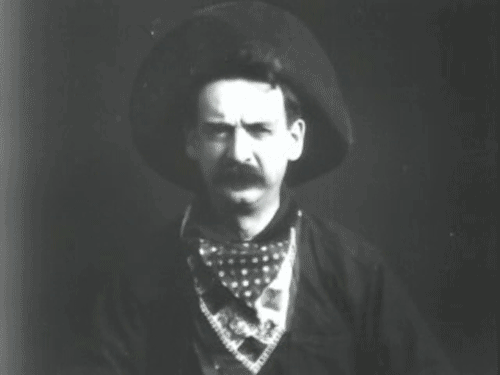
The Western arguably was born with the 1903 film, The Great Train Robbery. This 12-minute short film is a classic, and one of the earliest achievements in film-making. It’s also, unsurprisingly, a Western, and based on an actual train robbery. At the time it was made, the Wild West had only really ended a few years prior, with its heyday being about 40 years past. Which, yeah, is CRAZY. People who remembered the Wild West lived into the 1950s and ‘60s. It seems like so long ago, and it was, but it was still relatively recent from a historical standpoint.
From then, the Western remained a staple of cinema, and would be so for over half a century. And then, enter John Ford. Born in 1894, the Irish American director began his career in 1914 as an assistant and handyman, often working with his older brother Francis. Eventually, John took his place as a director, starting with silent films, especially westerns. Starting with the very successful film The Iron Horse in 1924, he quickly rose to stardom. He transitioned from silent films to talkies pretty effortlessly, and continued his streak. All the while, he was also one of the first directors to have a roster of actors in his company. You know how Tim Burton always uses Johnny Depp and Helena Bonham Carter? Or how the Coen Brothers always use Frances McDormand and John Goodman? Or Wes Andersen with Bill Murray and Owen Wilson? Yeah, that started with John Ford and...ugh...
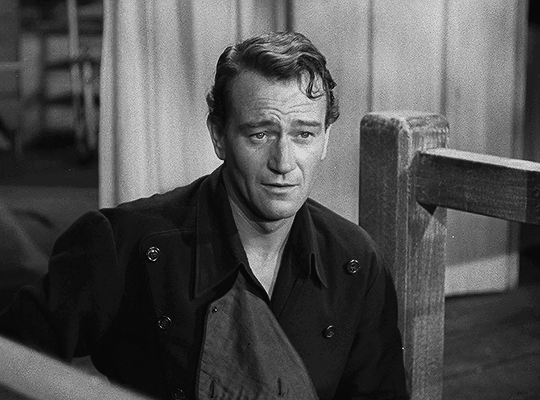
Before I start...fuck John Wayne.
Dude was a racist homophobic asshole, and absolutely a dick. Look it up, or don’t if you’d rather not have one of cinemas most iconic faces completely ruined for you. But OK, outside of that one time that he said that the Native Americans were “selfishly trying to keep the land for themselves”, or that he believed in white supremacy over uneducated blacks...yeah, he’s a DICK...
Marion Robert Morrison was born in Iowa in 1907, and began his film career after becoming injured while surfing without a surfboard and ending his football career. Yes, really. His football coach was a friend of a film director named John Ford, who hired Morrison as a favor to him. Said football coach was also friends with an actual remnant of the Old West: WYATT FUCKING EARP. YEAH.
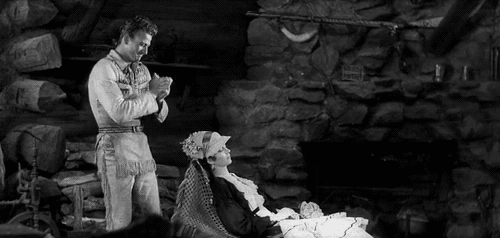
For years, Morrison was a bit player until starring in the film The Big Trail in 1930, a Western directed by Raoul Walsh. And he wasn’t exactly famous after this, but it was with this film that he took up a screen name: John Wayne, after a Revolutionary War general, Anthony Wayne, and...well, the name John. Anthony sounded too Italian. Yes, really. After this movie, Wayne continued to star in more Westerns, and even became one of the first film cowboys to sing on camera.
And then, 1939 came along, and John Ford came to him with a new film project. Being a classic Western, the film was about a group of settlers riding on a stagecoach together through the West. Strangers to each other, they find themselves attacked by a group of Native Americans belonging to the Apache tribes. This film, an adaptation of a 1939 short story, would come to be known as Stagecoach. And it would launch Ford, Wayne, and the Western genre into a Golden Age. So no more navel-gazing, let’s get started!
SPOILERS AHEAD!!!
Recap

I get reminded that I haven’t watched a Criterion Collection film in a while, and the film begins with a rousing Western theme, courtesy of...holy shit, this movie has SEVEN COMPOSERS? Well, OK, courtesy of somebody in that list of seven. From there, we cut to a camp somewhere in the Arizona Territory in 1880. Which, again, is only 60 years prior to this film’s release date. There, a group of men discuss the danger imposed on them by the Apache, stirred up by the legendary warrior Geronimo.
And from there, we go to the town of Tonto, where stagecoach driver Buck (Andy Devine) lets a group of passengers out. One of these passengers is Lucy Mallory (Louise Platt), there to catch another shuttle to meet her husband in Dry Fork, New Mexico. However, the stagecoach gains an extra passenger in the form of the Marshal, Curley Wilcox (George Bancroft), who goes to find an outlaw also in Lordsburg.
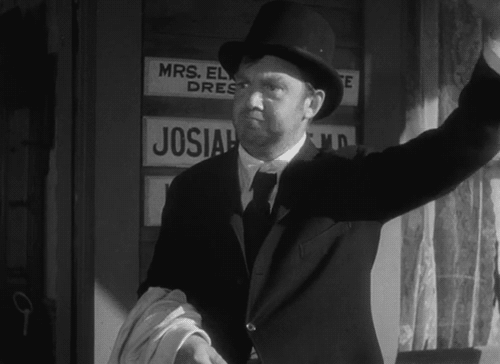
The passenger list builds with the addition of Doc Boone (Thomas Mitchell) and Dallas (Claire Trevor), a drunk and a prostitute both driven out of town by the Law and Order League of Women, due to social stigma affecting them both. In a bar getting a farewell drink, Doc meets yet one more passenger, Samuel Peacock (Donald Meek), a whiskey salesman that Doc is glad to meet. Meanwhile, banker Henry Gatewood (Berton Churchill) also boards the vehicle, under mysterious circumstances.
Friends of Lucy are worried with her travelling a drunk and a prostitute (the ABSOLUTE SCANDAL), but she needs to visit her husband in Dry Fork. As she leaves, she meets eyes with the dangerous but enigmatic gambler Hatfield (John Carradine). And before they’re able to leave altogether, the carriage is stopped by the army, who warn them of the Apache and Geronimo. All of the passengers refuse to get off, and YET TWO MORE passengers board to protect the carriage: the Marshal and Hatfield. And finally, they’re off! But as they head out, they’re stopped when they encounter a recently escaped outlaw.
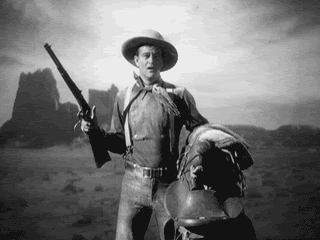
This is The Ringo Kid (John Wayne), who just got out of prison. The Marshal sees him, and takes him into custody on the way to Lordsburg, where they plan to drop him off into jail. And yes, he’s put on the fucking stagecoach. In total, we have Buck, the Marshal, Lucy, Hatfield, Doc, Peacock, Gatewood, and the Ringo Kid. Jesus, that’s a crowded-ass carriage, even if two of them are outside of it. Hell, Ringo’s sitting on the fuckin’ floor!
Anyway, the group interacts and introduces themselves. We learn that Doc once patched up Ringo’s brother, and was discharged from the Union Army for drunkenness. We learn that Hatfield is a true southern gentleman, and a veteran of the Confederate army (much to Doc’s ire), and that Ringo’s brother was murdered under mysterious circumstances.
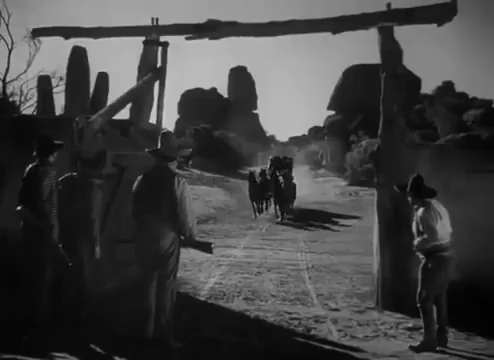
The group gets to Dry Forks, currently under occupation by the army. Said army had accompanied them (outside of the carriage, thank God) to Dry Forks, and are staying there to guard against the Apache. Meanwhile, Lucy’s dismayed to find that her husband isn’t in fact there. This leads to the debate of whether or not the party should go back to Tonto, or head onwards to Lordsburg. Buck wants to go back to Tonto, as does Peacock, while literally everybody else wants to go to Lordsburg. And so, they continue onwards.
Before heading onwards, the group sits for dinner, during which Ringo is the only one to show any form of kindness to Dallas, as everybody else looks down on her for prostitution. Shit, man, they won’t even sit near her at the table. Jesus. Unfortunately, Dallas is used to this cruel treatment, and it allows her to bond with Ringo in her loneliness. Once again, character interactions reveal things about our cast. Lucy is feeling quite ill, and Hatfield reveals that he served under her father in the Confederate Army.
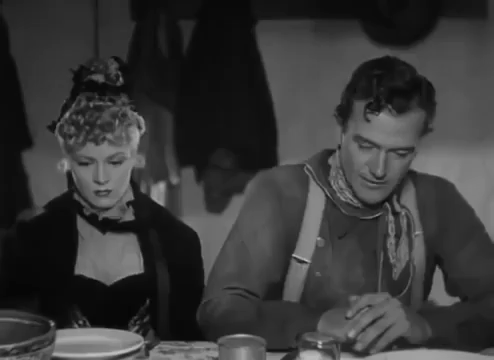
And from there, the coach continues on through the desert. Buck and the Marshal argue about letting Ringo free, as he aims to continue his feud with the outlaw Luke Plummer and his brothers, despite the fact that he’ll likely be killed by them. It’s for this reason that the Marshal wants to keep Ringo in his custody, as he was good friends with his father and doesn’t want to see him killed by the dangerous Plummers, whom Buck thinks should be taken down regardless.
Inside the coach, the banker reveals that he’s literally a Republican from 2016 (he rants about small government, and claims that a businessman should be President, holy shit), while people keep treating Dallas like shit, except for Ringo. They go through a cold mountain pass, which isn’t great for Lucy for some reason. It’s actually quite rough on everyone. Except for Doc Boone, who keeps drinking Peacock’s whiskey samples, which is hilarious.
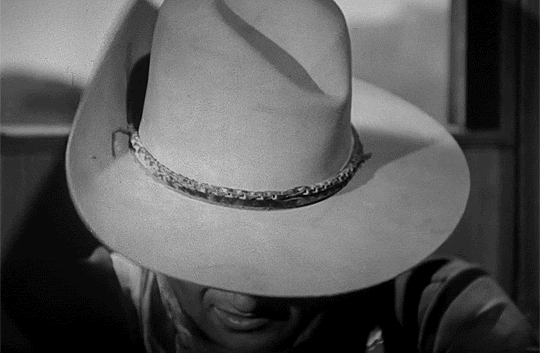
Finally, the group makes it to the next stop, Apache Wells. There, Lucy discovers that her husband has been severely wounded in a battle with the Apache, and she falls faint. Despite being absolutely SMASHED, Doc sobers up to help her, with the help of Ringo and the Marshal. Meanwhile, Dallas watches over her, despite the rancor that Lucy’s tossed at her this whole time.
The group stays the night, attended to by Chris (Chris Pin-Martin) a Mexican man who’s married to Yakima (Elvira Rios), an Apache woman who...is played by a Mexican singer. Huh. I mean...it’s still technically redface, unfortunately. But then again, the attitude towards Native American actors at this time was...oh boy. And the portrayal of the Mexicans in the camp aren’t exactly great, as a group of them steal the group’s spare horses, meaning that they only have one set of horses to use from here on out.
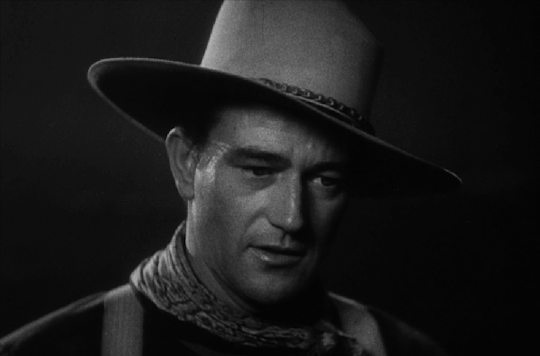
But amongst the unpleasant is a pleasant surprise, and the reveal of the cause for Lucy’s mysterious condition: she’s pregnant. Or rather, she was, as the baby’s just been delivered, and is being held by Dallas. As the group celebrates, Chris warns Ringo to stay away from Lordsburg, as the Plummers will kill him. But Ringo has something else on his mind.
See, on seeing Dallas with the baby, he finds himself quite in love with her. He finds her outside, and tells her that his father and brothers were killed by the Plummers. In turn, she reveals that her family was massacred on the real-life Superstition Mountain. Their conversation ends in Ringo proposing to Dallas, which she protests to because of her mysterious past.
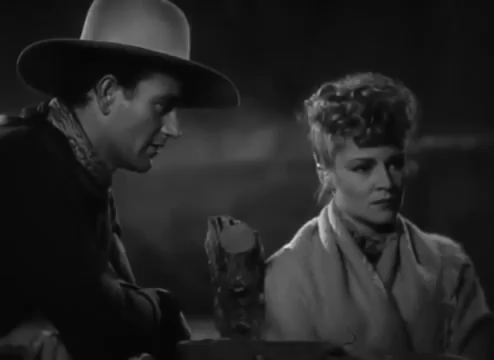
The next morning, Yakima’s left with Chris’ horse and rifle, and the group worry that she’s gone to tell the Apache. After Gatewood panics about his mysterious valise being possibly stolen, the group packs up and readies themselves to go. But Lucy is, of course, still ill from literally giving birth hours ago. Things are still tense between Lucy and Dallas, despite Dallas taking care of her the entire fucking night. Jesus, lady, that high horse is looking uncomfortable, you should get off it.
Dallas has something else to worry about, as she’s thinking on Ringo’s proposal. She consults with the doctor, who reminds her of her mysterious and checkered past being revealed if she goes. But she doesn’t seem to care, and she decides to accept the proposal. As for the rest, Gatewood’s freakin’ the fuck out. Because of Lucy’s condition, the doctor requests that they don’t leave until a day later. And Gatewood doesn’t give a single shit, as the Apache are close enough. Still, the party decides to stay, at Hatfield’s added insistence.
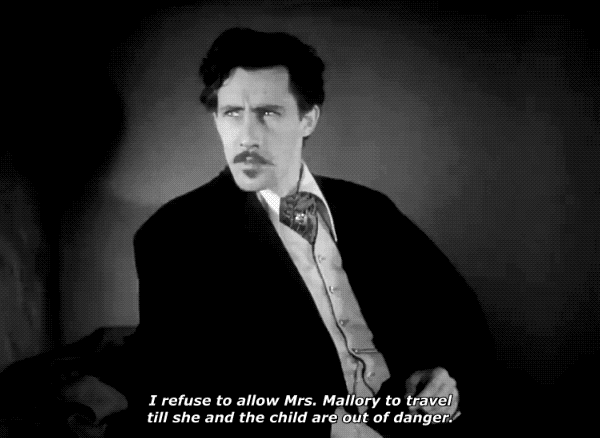
Ringo and Dallas talk, with Dallas both warning him of the Plummers, and also accepting his proposal. The men are all still arguing about whether or not they should leave, and they note that the Apache are likely between them and their destination. Ringo then takes the opportunity to escape and ride to Lordsburg for revenge on the Plummers. But he stops when he sees smoke signals on the hill. The Apache are coming.
No more waiting, it’s time to GO. Taking the still recovering lady and her newborn child Coyote into the stagecoach, they take off into the desert. Gatewood continues to run his loudmouth, to the ire of Hatfield and Ringo. And Peacock, to my delight, shows some kindness and “Christian charity” to Dallas, as she holds Coyote during the ride. And after all, they’re almost at the ferry!
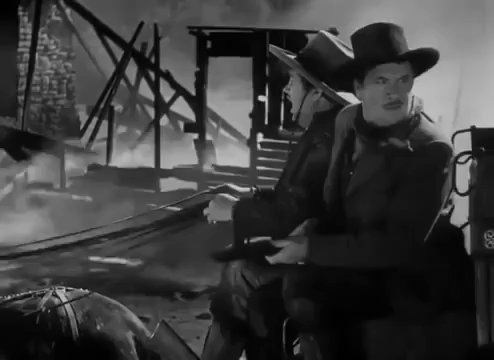
Ah, shit, the ferry! Looks like the ferry, and the entire town of Lee’s Ferry have been burned. And if they ford the river, all of their supplies could be flooded, or the oxen could drown! Or worse, dysentery could set in! That’s what The Oregon Trail taught me! And yet, despite this, that’s actually EXACTLY what they do! And unlike me literally every time I’ve every tried to cross a river without a ferry, they make it through fine! Realistic educational games my ASS!
But it’s not entirely safe, as the group are being watched by none other than the Apache, who make their way down to intercept the group. In the carriage, meanwhile, the group is thankful that they’ve made their way from danger, and even Gatewood relaxes a little. Doc Boone makes a toast, and everyone seems to be getting along for once.
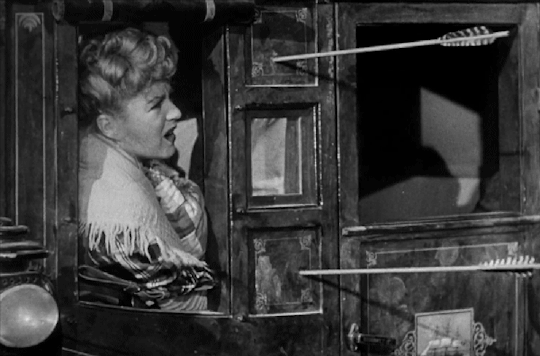
OH FUCK, PEACOCK GOT HIT!
The girlfriend IMMEDIATELY SAYS, “Now he really is Drew Peacock.” I leave and get boba to soothe my injured spirit from that well-timed joke. And then, the movie continues, and the chase is on! The Apache chase the stagecoach through the desert, and the groups trade gunshots and arrows, with Ringo shooting from the back. Gatewood panics so hard that Doc Boone punches him and IMMEDIATELY knocks him out, as he attends to Peacock’s injuries.
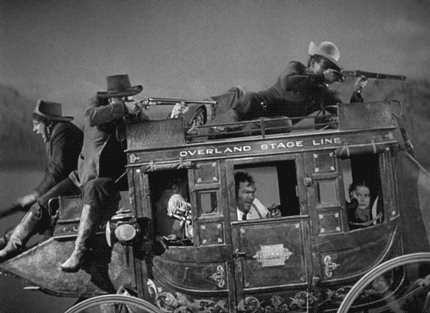
But despite their best efforts, the Apache group catches up to them, although many of them are killed by Ringo, the Marshal, Doc, and Hatfield. In the process, Buck is also shot, and Ringo literally jumps ON THE FUCKING HORSES, and commands them from the front like a goddamn badass. Things begin to get worse, as everybody in the stagecoach runs out of ammo, at the worst possible time. Hatfield only has one bullet remaining, and he considers using it...to kill Lucy! Holy fuck!

And just as he’s about to fire IN HER FUCKING FACE, the sounds of horns ring out as the cavalry arrives. And Hatfield, dick that he is, is shot. I think he was trying to spare her the indignity of being captured by the Apache, but Jesus, man! He collapses, and reveals that his father is a judge in Virginia before he...either passes out or dies, I’m not sure. The group finally gets to Lordsburg, where it turns out that Lucy’s husband is gonna be OK, and wasn’t severely injured. She tanks Dallas for everything that she’s done, and promises to help her should she ever need assistance. Good, finally, the lady needs a goddamn break.
The stagecoach rides through the busy town, and the arrival of the Ringo Kid gets the attention of Luke Plummer (Tom Tyler), who fetches his brothers Hank (Vester Pegg) and Ike (Joe Rickson). Time to get ready for a showdown, it seems. Dallas seems to know this, and goes to Ringo after the living Peacock (yay!) and the not-so-living Hatfield (oof) are brought in for medical help.
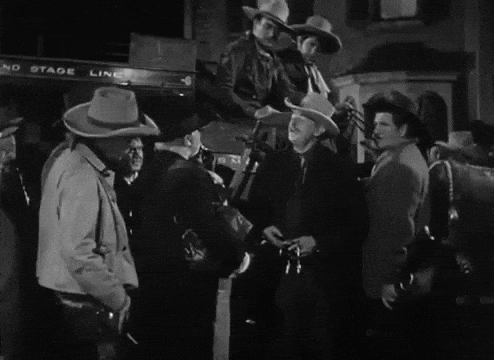
Buck’s also OK, but Gatewood isn’t. See, that valise he was carrying was actually full of money, and he had embezzled it from his own bank. He had counted on telegraph lines being down, so that he could escape with his ill-gotten gains, but has no such luck, and is led away in handcuffs! HA!
Ringo, meanwhile, is set to kill Luke Plummer and his brothers. The Marshal lets him escape, and promises to get Dallas safely down to a little ranch he owns in the South. Dallas and Ringo walk off together, and Dallas tries to get him to leave and say goodbye before he goes to his death, and before he finds out about her past (presumably as a prostitute).
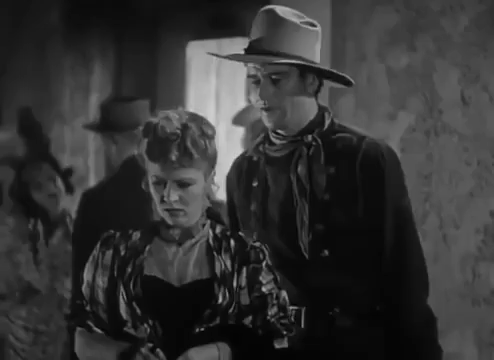
See, they’re actually walking up to a brothel, where Dallas is going to stay and work. Because, yeah, she’s a prostitute. Sucks that she’s been so maligned, because prostitution fuckin’ BUILT the Old West! I guess it’s easier to see that with historical context. As Ringo finds out the truth about Dallas (which he might’ve known all along), he still insists upon marrying her...and upon killing the Plummers.

Doc, meanwhile, goes to the bar where the Plummers are waiting. He tells them that he’ll get them arrested, and Luke swears to come back for him after their business with Ringo is concluded. The brothers head outside, ready for the final showdown. It’s 3 on one, Plummers against Ringo. Ringo fires! A few more shots...then silence. And Dallas mourns.

Except that Ringo wins the fight, and goes back to her! A happy ending! I’m sure that’ll be pretty goddamn rare this month. The Marshal arrives to take Ringo away, and Ringo goes as promised. She asks to ride with him a bit, and the Marshal agrees. He and Doc watch them get on, then cause the horses of the carriage to stampede away, letting Ringo and Dallas escape into the desert, together. And that’s the end!

Y’know...I liked it! I really liked it!
This movie is often referred to as the greatest Western of all time, and the reason that the Western survived into the next several decades. And honestly, I get it! It was nominated for 7 Academy Awards, and won for Best Supporting Actor (Thomas Mitchell, AKA Doc) and Best Original Score, both of which were quite deserved!
Review time!
Cast and Acting - 9/10: Sure, it’s a little hokey. But at the same time, it’s good classic Hollywood acting! Wayne, Trevor, Mitchell, Carradine, and Devine are standouts for me, all of which serving their roles well. Also, fun fact about Andy Devine: he’s the voice of Friar Tuck in Disney’s Robin Hood! KNEW I recognized that voice!
Plot and Writing - 10/10: Standard plot? Sure. Engaging as hell? Hell yeah! This is just a good story, plain and simple. No holes, no problems, no mistakes, and purely straightforward. Great writing by the original story author, Ernest Haycox, and great screenplay by Dudley Nichols!
Directing and Cinematography - 10/10: Great looking movie, too! All credit to John Ford, unsurprisingly. Cinematographer Bert Glennon also deserves credit for the beautiful landscape shots throughout. Gogeous film, even in black-and-white!
Production and Art Design - 8/10: This is pretty standard Western production design, so not a lot to write home about specifically. However, that doesn’t mean it’s bad. To the contrary, it’s quite good! Just does stand out to me quite as much as other movies. Might be a nitpick, but it’s still something against the film.
Music and Editing - 10/10: No complaints! Seven composers definitely make their presence known, and you can tell that this score heavily informed all Western scores after it. It’s iconic, and it’s perfect for the mood. As for the editing by Otho Lovering and Dorothy Spencer...it’s great! Perfect pacing, well-edited...no complaints whatsoever.
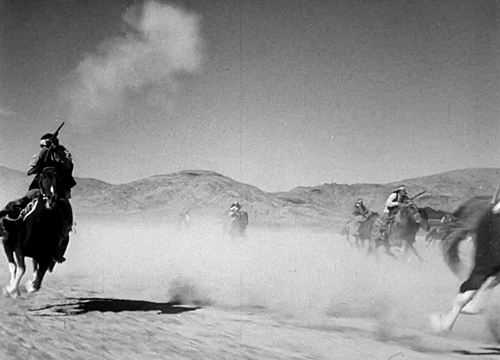
94%, and I had fun with this one!
I honestly did have quite a good time with this one. I can’t really call it a “fun” movie, but it definitely is a good one. Plus, it’s a John Ford/John Wayne film, which is basically a staple of the genre. So, what’s next?
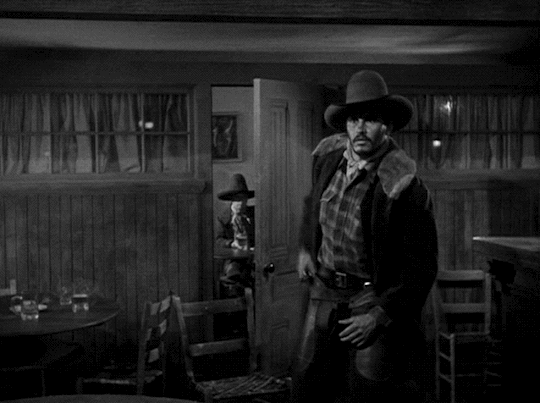
Next: My Darling Clementine (1946), dir. John Ford
#stagecoach#stagecoach 1939#john ford#claire trevor#john wayne#andy devine#john carradine#thomas mitchell#george bancroft#apache#western august#365 days 365 movies#365 movie challenge#western genre#user365#usersasha#my gifs#mygifs
9 notes
·
View notes
Text
Why are you here - Jamie Oleksiak
Word Count: 3189
Requested: Yes
POV: Reader
Warnings: NSFW, Smut, Language, angst
Notes: Please note the times in which this story takes place. Since you all loved the first Jamie O story, here’s a new. Hope you enjoy this one just as much! Happy Reading all!!!

You’d met Jamie on Valentine’s day in 2016. On a whim, you and your friends had decided to have a Galentine’s day and all go out to dinner together. One of your friends had made reservations for the five of you at a nice restaurant in downtown Dallas. The meal had been great, but the drinks afterward at a nearby bar even better. That’s when you saw Jamie, he was there with some friends as well. His sheer frame alone caught your attention. One of his friends sent you all over a round of drinks and the next thing you knew, you were all walking over to say thank you.
Jamie was shy and quiet, not really participating in the conversation at first; which intrigued you. You wanted to know more about this gentle giant of a man, and so you decided to get to know him a little better. The more you talked to him, the more your attraction to him grew. He was sweet and kind, with a killer smile. He asked for your phone number and things progressed from there. Over the next month, you two were practically inseparable, at least when he was in town.
By the first part of April, the two of you were exclusive. Most nights you either spent at his place or he stayed at yours and when the season ended, he took you on a week-long vacation to the Caribbean. He spent most of the summer in Toronto, though he’d fly you up for long weekends or fly back to Dallas from time to time. He even had you join him and his family in Rio when his sister competed in the Olympics. Things between the two of you were so good, you never saw the breakup coming.
December 2017…
“What do you mean they’re looking to trade you?” Jamie had sprung the information on you after the two of you had dinner at his place.
“I’m not sure what part you don’t get. The GM called me and said they’re working on a deal with Pittsburgh.” It was the first time in your relationship that you couldn’t read where his thoughts were on the issue. Did he want this? Or did he want to stay in Dallas? And what did this mean for the two of you? You wanted to ask all these questions, yet somehow you didn’t.
“Are you ok?”
“I mean what am I going to do about it.” He was so tight-lipped about this, you didn’t know how to handle things.
“Do you want to talk about it?” You thought he would know by now that he could tell you anything but wanted to spell it out for him just in case.
“Not really.” You rolled your eyes in frustration if he didn’t want to talk there was nothing you could really do.
He was sitting at the kitchen island, head in his hand, just sort of staring off into space, while you finished up the dishes. As soon as you put the last dish away, you walked over and wrapped your arms around his waist. Just as you went to tell him that everything would be fine, his phone rang and your heart sank. He jumped out of your embrace and wandered around the living room. There was a lot of ‘okays’ and ‘sures’, but the one that cut the most was ‘I understand.’ And then the call was over. His face hung low and you didn’t need to ask what the conversation was about, to know he’s been traded to Pittsburgh. He didn’t say anything just stood there and so did you. A tear slid slowly down your cheek as his phone rang again. You didn’t hear any of the conversation as the ringing in your ears was way too loud. As soon as he hung up though, he had your full attention. “I have to be on the plane tomorrow morning at seven.”
“What? Why so soon? I don’t understand.”
“Fuck (Y/N) how can you not understand. This is my job, you knew this could happen when we started dating.”
He was angry, more about the trade than your questions and you knew that deep down; though his words still hurt. You just wanted more time. Time to talk, time to figure out what this all meant for the two of you. It wasn’t something that you ever discussed, yet here it was happening. He headed back to the bedroom and you followed him. “Jamie…”
You wanted to say more, but his voice stopped you. “I can’t do this right now. I have to pack.”
“We have to do this now.”
His phone rang again. You wanted to take the damn thing and smash it against the wall. This time there was a little bit of a spark to his voice, and you heard him say, ‘I’m excited to be there too. Pittsburgh is a great team.’ Had you actually heard him just say that. From what you could tell, this was not a man elated to be going to another team. When he finally ended, he looked up at you. You knew what he saw, tears in your eyes and worry written all over your face. “I’ve gotta look at this as a fresh start. I haven’t had the best of seasons and this is at least a chance to prove myself.”
“A fresh start huh?” Those were the words that stuck out the most. “In everything?” you added.
“Yeah, I think so.” You felt your heart splinter into a million pieces and in that moment you knew there was nothing you could say to change his mind. Though you knew this day could happen, you expected that he’d ask you to go with him. Maybe not right away, but at least within a few weeks. Never in your life did you expect this; for him to treat you with such indifference. “We can still be friends (Y/N).”
“We’re not friends Jamie. Right now, I don’t know if we ever were.” With that, you grabbed your purse and left. He never called or texted, and neither did you. It was just too hard to think that he could so easily move on without you.
Current day… (January 2019)
The first few months without Jamie had been hard. You missed everything about him. The way he cuddled you, the way he would call during the day just to hear your voice, and the sex, ugh… It had been simply amazing and to go to nothing, well...it was horrendous. Though somehow you fought through everything and continued on with your life. Eventually, you started to move on, going out to the bars and dates every so often. And though it was hard, you tried to block out all thought of Jamie.
It was why you were hesitant to say yes when Aaron one of the Stars trainers asked you out. Eventually, he convinced you to say yes. He was sweet and kind, but you weren’t sure you could see yourself long-term with him. Still, you gave the relationship a chance, and when he asked you to attend a Stars event about two months into dating; you couldn’t say no.
The air was chilly that night, as it was the end of January, and Aaron had an arm wrapped around you, as you entered the building. He was all dressed up in a suit and tie, something that didn’t usually happen, and you truly appreciated how good he looked. “Did I mention how hot you look tonight, in that suit?”
A cute shade of pink stained his cheeks. “Thanks, I had to step up my game with you by my side.” He brought your hand to his and placed a chaste kiss on your knuckles. “You always look amazing, but tonight.” He held you at arm’s length to take in your appearance. “You’re absolutely gorgeous.” You’d chosen a short length white lace cocktail dress, with long sleeves and a low cut bodice. Its nude underlining gave the appearance that you were showing skin, but in actuality, you felt very covered up.
“Thanks, I was hoping you’d like this dress.” You were also hoping that it would help spice things up in the bedroom, for your relationship was severely lacking in that department.
“I more than like it, but I’m afraid so will half the guys on the team.”
“Oh stop.” Once you were finally inside, the conversation switched and soon you were laughing and joking with all those around you. Aaron stayed by your side when you first got there; his hand either entwined with yours or on the small of your back. You were in an in-depth conversation with Ben and Andrea Bishop when you felt someone’s eyes on you. Looking from side to side, it took you a moment before you saw him standing there off to the side, with some woman you’d never seen before. It was Jamie, your Jamie. Your first thought was, why the hell was he here? He belonged in Pittsburgh. He’d gone there over a year ago, there was no reason for him to be back in Dallas. You politely excused yourself and headed to the restroom to collect yourself.
The minute you walked into the empty hallway, you felt him following behind you. By the time you got to the restroom door, you thought you were safe; until he harshly whispered your name. “(Y/N).”
You swiveled on your heel, turning towards him. “Why are you here?”
“I got traded back.” That’s all he said nothing more.
“You’re fucking with me aren’t you? Like this is some kind of joke or something.”
“It’s no joke. I’m back playing for the Stars again.” There were a million butterflies in your stomach and they were all moving at once. What did this all mean? Then you remembered the woman standing beside him.
“So you’re what back in Dallas for a hot second and you’re with someone. Or was she actually worthy of moving here with you, unlike I was when you went to Pittsburgh.”
He took one long stride towards you and you took one back, feeling the wall press up against your back. “It’s not like that, but what about you? I saw you with Aaron when I left did you just move on with him or what?”
“Fuck you Jamie!” you fairly spat the words at him. “It killed me when you left. You didn’t call or text, nothing. It was like I was some speck of dirt in your life you wiped away and then kept going. So don’t try and put this shit on me.”
“Jesus, what did you want me to do?” He was inches from your face now, and you could feel his breath. “I got traded, it was my job to move.”
The fact that he still didn’t think about taking you with him, cut deep; though you didn’t want to tell him that. “Yeah well it’s obvious, you moved on in more ways than one.”
“The same way you have, I see.” You pursed your lips, the action drew his eyes to your mouth. You’d seen that look in his eyes before. It was needy and hungry and called out to you on the most basic of levels. Unconsciously, you bit your lower lip. It was a bad habit and one you knew drove Jamie wild. “Fuck (Y/N), you know what that does to me.”
Closing your eyes, you willed yourself to get your primal instincts under control. Just being this near to Jamie, turned you on. The heated sensations you were feeling in this moment, you hadn’t felt in over a year and you longed to have his hands on you again. But he was with someone else, somewhere your conscience reminded you were too. When you finally opened your eyes, his lips were less than an inch from yours. You struggled to get oxygen into your lungs, as your chest rose and fell. Somehow you found yourself saying, “We can’t.”
“Really?” His blue eye burrowed into yours. “Does he make you feel like this? I know you (Y/N), I know when your body wants something, and right now it’s screaming that it wants this.” He placed his large hand on your hip, as he pressed his body into yours. You could feel his hard length against you and immediately you grew damp with need. A small moan escaped you, and that was all Jamie needed. His mouth was on yours hot and hard, and you opened to him without thought. He took control of the kiss; it was everything that you remembered, only better. There was no seeking or searching for what you liked, for Jamie already knew.
A voice sounded down the hall, and you pulled back immediately from the kiss. The hallway was still blessedly empty and you thought you could escape everything that you wanted at that moment until Jamie opened the door and pushed you inside. “You’re not getting away so fast.” He locked the door then, barring out the rest of the world, before kissing you hard again. “Fuck I missed this.” He breathed out. They were the words that were echoing in your brain, but couldn’t give voice to, as he trailed his hand up your inner thigh. When he cupped your sex, you gasped for air as if it was the first time in your life someone had touched you there.
“So wet.” His fingers pushed your panties aside and slipped inside you. “You were always so wet for me.” It was true, you couldn’t deny that fact. Jamie’s touch, his words, hell, his presence alone could turn you on like no other. The fact that it still happened even after everything that had happened; you couldn’t quite comprehend and at the moment didn’t want to.
You needed to level the playing field, so you skated your hand down his chest to the front of his clothed cock. The hard length of him felt good as you palmed him through his suit pants. Quickly, you undid his belt and button, so that as you unzipped his pants you could snake your hand inside his boxers. Running your nail along the underside of his cock, feeling his familiar ridges. He sucked in a harsh breath at your touch. “Fuck (Y/N).” Before you knew what was happening, he pushed two of his fingers deep inside your pussy, while his thumb flicked over your clit.
“Oh god, Jamie.” You threw your head back as he started to pump in and out of you, while at the same time you stroked his length. His free hand started to scrunch up the side of your dress. Were you really going to fuck your ex-boyfriend in a bathroom? You tried to come to your senses, but every time reason would creep in, Jamie would hit that spot and make you weak again. “Jamie…I…”
“Shhh…baby, I know what you want.” He removed his drenched fingers from your dripping cunt then, pushing your dress up over your ass. In one swift move, he ripped your panties off your body. Your hands pushed his pants and boxers down, to pool around his knees. When you tried to turn around, for him to take you from behind; he stopped you. “No way, babe. I need to see your face when I make you cum.” He lifted you up and placed you on the edge of the sink. Dick in hand, he guided himself to your soaked pussy, wetting himself in your folds.
Hooking a leg around his waist, you urged him to enter you. He took his time, even though you didn’t have it; giving you just the head of his cock at first. Then he leaned his forehead against yours and kissed you. His tongue sweeping in and swallowing the moan you made as he filled you up. It felt like coming home, he fit so perfectly in you. Part of you wanted to weep with joy from finally being with him again, yet there were tears of sorrow as well, from everything that you’d lost with this man and you weren’t sure if you could ever get back. A lonesome tear slid down your face, but before you could get swept up in the emotion Jamie started to move.
His hips thrust into you and you bucked yours to meet him. Taking your other leg, he wrapped it around him and then lifted you up as he fucked into you. He spun you both around, then pushed you against the wall, as he thrust deeper into you. Your back arched into the hard surface with each thrust and you knew there would be bruises there in the morning, but right now you didn’t care. You had Jamie’s cock in you and that’s all that mattered. Finally, you had to break the kiss, as you panted for air, but with the rocking of both yours and Jamie’s hips, all that came out were moans of pleasure. They seemed to fuel Jamie on as he picked up speed. Your orgasm started to build from deep within you. Tiny little tremors started to quake inside you, and then Jamie thrust into you hitting that sweet spot and you were gone; moaning out his name, as your pussy quivered around him. He thrust one last time, pumping his cock deep into you as he spilled his seed; stifling his moan against your neck.
He held you against the wall a little longer as you both tried to reign in your breathing. Slowly reality started to set in. What the hell had you just done? You squirmed in his arms; he only held you tighter. “Jamie put me down.”
His head drew up from your shoulder, to look at you quizzically as if to say ‘why?’
“We shouldn’t have done this.” He slid out of you then and immediately you regretted the loss of him inside you. But you straightened your clothes the minute he set you back on the ground. It took a minute to regain your composure and by the time you looked back at Jamie, he’d looked as though nothing had happened, except for the frown on his face.
“Why (Y/N), tell me why we shouldn’t have just done this, as you put it.?”
“Because Jamie, you’re here with someone else, and so am I. Not to mention that we’re not…” you searched for the right words. “We’re not anything.”
“Do you love him?”
“What does that have to do with anything?” This wasn’t about you and Aaron, hell you weren’t exactly sure what it was about, but not that.
“Fuck (Y/N), it has everything to do with this.”
“The way I see it, you gave up any right to know my feelings on anyone when you left.” He went to say something and you held up your hand. “This isn’t the place for it. I need to go.” With that you walked out of the restroom, closing the door on Jamie, just as he had on you a year ago.
#Jamie Oleksiak#Why are you here#Jamie Oleksiak imagine#Jamie Oleksiak imagines#jamie benn smut#dallas stars imagine#dallas stars imagines#hockey imagines#hockey imagine#hockey fanfiction#nhl imagines#nhl imagine#nhl fanfic#nhl smut
346 notes
·
View notes
Text
PINHAIS: A Testimony of A Living History

(Translated from Maria Martinho's article, edited by S. M. Amamangpang)
A stone's thrown from the sea, Matosinhos is the epicenter of the canning industry to the north of Portugal. In that area alone, 52 fish factories were installed, today only two remain and one of them is PINHAIS. The company was founded in 1920 by António Rodrigues Pinto Pinhal together with his brother Manuel Rodrigues Pinto Pinhal, natives of Espinho, who initially dedicated themselves to salting fish in a small warehouse, and Luíz Alves da Silva Rios, who is believed to have launched the challenge to the two fishing brothers to set up a company dedicated to the manufacture of canned fish, to which Luíz de Sousa Ferreira later joined. With the construction of the factory, the company started to produce canned sardines, mackerel and horse mackerel in olive oil, spicy olive oil, tomato and spicy tomato sauce. “We still maintain the original process. From the treatment of the fish to the packaging, everything is done by hand,” guarantees António Pinhal, grandson of the founder and currently responsible for the family business that is in the third generation.
He was only eight when he had his first memory linked to Pinhais. Hand in hand with his father, he saw trawlers loaded with fish arriving at Matosinhos pier on a Saturday morning. “I always did that at the weekend, it was happy to see the seagulls approaching, it was a sign that there was a lot of fish”, he tells The Observer. Later, he was in his fourth year in Economics at the University of Porto when his father asked him to work with him. “My cousin was his right hand, but he got sick and called me. I went to the auction to buy the fish, did the commercial and export part. Only when my cousin passed away did I join the staffs of the company directly and, as a working student, I finished the Economics course at night. ”
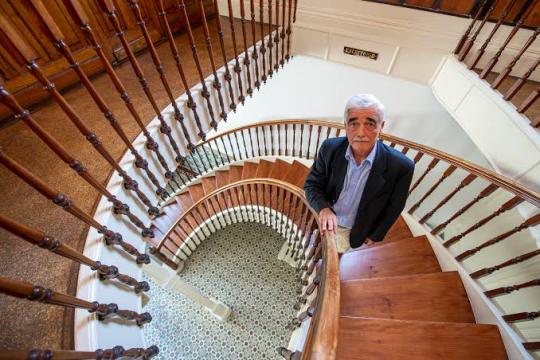
For a decade, António was responsible for carefully choosing the raw materials for preserves, a function that allows him to distinguish the quality of a sardine with the naked eye today. “The sardine caught at four or five in the morning is better than the hake at midnight, I can see that from the eyes, the gills and the scales”, he says, adding that it was also on the wooden base of the trucks used to transport the baskets of fish that could take the real test of the nine. “I would take the sardine and throw it to the wood, if it jumped it had been caught in the morning, if it was quiet it was because it had been caught earlier.”
When he finished his Economics course, he already had several job offers, but his father said: either the bank or the factory. “The bug got into me and I ended up staying here. I don't know if I did it right or wrong, but I don't regret it.”
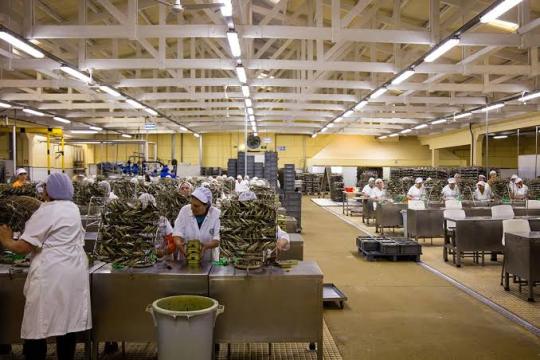
While most canning companies have industrialized over the years, Pinhais has decided to remain faithful to artisanal production, despite the various crises. “There was a Portuguese olive oil supplier that sold the product much cheaper and one day he asked my father if he didn't want to buy a car, which at that time cost about 100 contos, with the money he saved. My father did not have a license nor did he know how to drive, so he refused.” It was like this for four years, until it was discovered that this oil was adulterated. “The containers that other firms distributed to the United States were recalled and the canning industry crisis started there.”
In 1935, Pinhais launched Nuri, a brand with the same products, but aimed at the international market. “One of the partners in the company was my uncle, a public relations person who spoke several languages. It was he who discovered the first international markets and when he went to Spain he met a very beautiful Spaniard named Nuri, that's how he decided to name the brand. ”

During the 40 years that he is at the helm of the canning industry, António Pinhal confesses that the most difficult moment was when the European Union's share of fishing emerged. The golden season in Matosinhos was from June to October, which forced the official to go buy fish in Sines, Peniche, Figueira da Foz, Spain or France. Nothing that would move him or make him lose his faith, after all the Pinhal family is deeply Catholic and in António's office are visible old cans, black and white photographs of the family, but also saints and candles.
“My father went to Mass twice a day and until three years ago we used to pray the rosary half an hour before the people left.” At 4:30 pm, someone put a cassette in the tape recorder and workers exchanged fish scissors for the rosary. “We stopped doing that when we hired people with other religions, it didn't make sense to be imposing that. It used to be different, people were more devout, especially when we talk about a fishing community. Times change and we have to accept those changes. ”

The fish arrives every morning through a special door, leaves the boxes and is immersed in an aluminum container in cold water and salt where the brine is given. “The large sardine is 40 minutes, the medium is 15 minutes, and the petinga, 5,” says António Pinhal. After this process, sardines, mackerel and horse mackerel are spread on large marble tables, where the head and the gut are removed with a small knife. "This is a normally mechanized process, but here we do it by hand to ensure that the gut comes out completely."
Headless and with a spine, the fish is placed one by one on a metal grid and dipped in a tank with cold water to remove the salt. The rooks loaded with fish are distributed in carts that enter a greenhouse at 100 degrees for 10 to 12 minutes. They come out of there hot and during the cooling process all the moisture and grease drain out. “Thus, both water and fat do not go into the can and oil, when added, turns yellow and not brown. This is one of our major differences from the competition,” explains António Pinhal.
It is only after this phase that the fish is placed in containers to then be cut by hand with scissors to fit in the can of preserves, which can then carry tomato sauce, cucumber, carrot or chilli pickles. In this assembly line, several employees dressed in white are seated in a row, from the cap to the wellies, passing through the waterproof apron. Many have their names written on the back and pillows to ensure comfort throughout the day.

Emília Vaz is in the section dedicated to homemade tomato sauce. She is 67 years old and is the oldest employee of Pinhais. She started at 18 and at the end of 2020, she will retire. With the reddish apron and the sweat on her forehead, she proudly shows the marks on her body that the years of work left him. “I've already cut myself on the toes with the cans and scalded my foot to make tomato sauce,” she says, adding that the factory is her second home and her colleagues are part of her family. She treats them by their first name and says she likes to teach those who arrive there for the first time. Among all, she is known as the “Emília da Afurada�� (Emília, The Sharp). “In the past, I crossed the Douro in a small boat, but nowadays I take the bus to Boavista and then take the metro to get here.”
About 30,000 cans come out of Pinhais every day, essentially filled with sardines. There is no waste around here, proof of this is that the fish's head, tail and gut is sent to the flour industry to fertilize the soil and the remaining oil is supplied to the soap industry. On the mechanical mat, the cans stuffed with fish and other ingredients arrive in a veritable rain of Portuguese olive oil and are then closed by another machine. Still greasy, the closed can is washed in a tank with water at 100 degrees and sterilized for 60 minutes to eliminate any bacteria and will be packed by hand. Three months is the minimum time to stay in the warehouse to gain flavor, only after this period of maturation is the canned ready to go on its journey.
Célia Ferreira is responsible for the packaging department and in the 15-minute snack break she is the only one in the room to wrap cans of preserves. “I can eat at home,” she says, smiling, guaranteeing that she likes what she does. Her mother, aunts and cousins passed through Pinhais, so it would be almost inevitable for Célia to also work at the Matosinhos factory, where 1,200 cans per day pass through her hands. The natural employee of Leça da Palmeira walks surrounded by cards and packages painted in yellow, green, red or blue and knows the destination of each one by heart. "These go to Australia, those to the United States and those to the Czech Republic.

In 2016, the Pinhal family sold its stocks to an Austrian agent, the current owner of the brand. “It was a decision motivated by the fishing crisis, there were no orders, we lacked liquidity and we thought it was necessary to take this step. He is a trustworthy person, he has worked with us since 1985, he belongs to a family business connected to cereals. At one time, he was our best customer, he represented more than 70% of our exports, and he became the only way to save this firm,” recalls António Pinhal. Despite the change, everything seems to have remained. “The only premise was to leave everything as it is.” Currently, Pinhais exports 90% of its production to countries such as Austria, the United States, the Philippines, Denmark or France. Here, the points of sale are limited to gourmet stores. ��Quantity is not quality. We bet on quality, while in large stores we buy a can of sardines at 0.90 cents, ours costs € 2.50. The labor is very expensive, we work with 14 or 15 stages, the other factories have only three,” justifies António Pinhal.
Extending the range of products is not part of the brand's plans, which work on original marble tables from 1920 and see their work space limited to small fish. However, there is a need to bring something new to the market, so next year, Pinhais will use leftover sardines to market patês. The online store was launched just in time for the pandemic and in the summer of 2021 a live museum is expected on the factory premises, a project that has lived in the drawer for several years and bureaucracy has delayed. “We want to make it known what the tradition of the canning industry was, showing, at the same time, how we work.”
António Pinhal is not afraid of the future and says that only the pandemic forced small changes in the company, such as the acrylics arranged among the workers, a laboratory converted into a quarantine room and more mechanized transport processes. The grandson of the founder of Pinhais eats preserves religiously every Friday at lunch. “Canning tins are normally six years old as an expiration date, but my father always preferred old ones that were 15 or 20 years old. Every Friday at lunch he opens an old can, watched, smelled and asked me to eat a piece. After five minutes, if I didn't feel bad, I would eat it. It was your guinea pig and I thought it was funny. ”

Source:
(https://observador.pt/2020/09/13/conservas-pinhais-a-fabrica-onde-se-rezava-o-terco-e-hoje-se-canta-o-fado-enquanto-se-enchem-latas/)
#Pinhais#Matosinhos#Portugal#sardines#sardinha#sardinas#sardinia#Nuri Sardines#Mabuti Sardines#Rios Sardines#artisanal#traditional
8 notes
·
View notes
Text
Steve Bannon Is Charged With Fraud in We Build the Wall Campaign
What would advise to Brian Kolfage, who lost both his legs and one of his arms during his service in Iraq, and created We Build the Wall as a GoFundMe page in December 2018, which was an immediate success, raising nearly $17 million in its first week online, but wanted to raise much more from donors: (1) Promise potential donors that he would not take a penny in salary or compensation and that all of the money he raised would be used “in the execution of our mission and purpose,” and then pay Kolfage $350,000 secretly from the donations for his personal expenses (and keep about $1 million for yourself too), or (2) find some other way to pay him? Why? What are the ethics underlying your decision?
Stephen K. Bannon, President Trump’s former adviser and an architect of his 2016 general election campaign, was charged on Thursday with defrauding donors to a private fund-raising effort called We Build the Wall, which was intended to bolster the president’s signature initiative along the Mexican border.
Mr. Bannon, working with a wounded Air Force veteran and a Florida venture capitalist, conspired to cheat hundreds of thousands of donors by falsely promising that their money had been set aside for new sections of wall, according to a federal indictment unsealed in Manhattan.
The fund-raising effort collected more than $25 million, and prosecutors said Mr. Bannon used nearly $1 million of it for personal expenses.
Despite the populist aura he tries to project, Mr. Bannon is known to enjoy the high life, and he was arrested at 7:15 a.m. on a $35 million, 150-foot yacht belonging to one of his business associates, the fugitive Chinese billionaire Guo Wengui, law enforcement officials said.
Working with the Coast Guard, special agents from the United States attorney’s office in Manhattan and federal postal inspectors boarded the yacht off Westbrook, Conn., the officials said. Mr. Bannon, 66, was on deck, drinking coffee and reading a book, when the raid occurred.
The criminal charges, filed a week before Mr. Trump was to accept the Republican nomination for a second term, marked a stark turn of fortune for the flamboyant political strategist. Mr. Bannon first came to prominence when he was in charge of the right-wing media outlet Breitbart, where he had aligned himself with the alt-right, a loose network of groups and people who promote white identity.
As chief strategist, Mr. Bannon was one of the most powerful figures in the White House early in the Trump administration, but he stepped down in August 2017 after frequently clashing with other aides.
With the indictment, Mr. Bannon became the seventh Trump associate to have been charged with federal crimes, a list that includes Paul Manafort, Mr. Trump’s former campaign manager; Michael T. Flynn, the former national security adviser; and Michael D. Cohen, Mr. Trump’s onetime lawyer and fixer.
The 24-page indictment, unsealed in Federal District Court in Manhattan, is by far the most politically sensitive case that Audrey Strauss, the acting United States attorney in Manhattan, has handled since she assumed her job after her predecessor, Geoffrey S. Berman, was fired in June by Mr. Trump.
At a brief arraignment on Thursday, Mr. Bannon, sunburned and his hair unbrushed, pleaded not guilty to charges of wire fraud conspiracy and money laundering conspiracy, each of which carries a maximum penalty of 20 years in prison. The government agreed to release him from custody on a $5 million bond.
Walking to his car after being freed, Mr. Bannon said, “This entire fiasco is to stop people who want to build the wall.”
Shortly after the charges were announced, Mr. Trump had sought to distance himself from Mr. Bannon and the fund-raising initiative, though the president also expressed sympathy for his former adviser.
“I feel very badly,” Mr. Trump told reporters in the Oval Office. “I haven’t been dealing with him for a very long period of time.”
The president said he knew nothing about the multimillion-dollar We Build the Wall campaign but quickly contradicted himself.
“I don’t like that project,” Mr. Trump said. “I thought it was being done for showboating reasons.” He called paying for the border wall privately “inappropriate.”
One of Mr. Trump’s sons, Donald Jr., publicly promoted the We Build the Wall effort at an event in 2019, calling it “private enterprise at its finest.”
Donald Trump Jr. said in a statement on Thursday that he had no involvement with the effort beyond praising it at that one event.
A White House official said that President Trump did not know Mr. Bannon would be arrested, and that he was told by aides after it happened.
Attorney General William P. Barr was briefed on the investigation several months ago, according to a Justice Department official, and the federal prosecutor’s office in Manhattan gave him notice that the indictment would be unsealed on Thursday.
According to the authorities, Mr. Bannon hatched the plot to defraud the donors with three other men: Brian Kolfage, a 38-year-old Air Force veteran and triple amputee from Miramar Beach, Fla.; Andrew Badolato, 56, a venture capitalist from Sarasota, Fla.; and Timothy Shea, 49, of Castle Rock, Colo.
Mr. Kolfage and Mr. Badolato were arrested in Florida on Thursday, and Mr. Shea, who prosecutors said funneled money for the group through a shell company he owned, was arrested in Denver.
Mr. Kolfage, who lost both his legs and one of his arms during his service in Iraq, created We Build the Wall as a GoFundMe page in December 2018. It was an immediate success, raising nearly $17 million in its first week online, prosecutors said.
To persuade potential donors to contribute to the effort, prosecutors said, Mr. Kolfage promised them that he would “not take a penny in salary or compensation” and that all of the money he raised would be used “in the execution of our mission and purpose.” According to the indictment, Mr. Bannon described We Build the Wall as a “volunteer organization.”
But all of that was false, prosecutors said. Instead, they claimed, Mr. Kolfage secretly took more than $350,000 in donations and spent it on home renovations, boat payments, a luxury S.U.V., a golf cart, jewelry and cosmetic surgery.
Mr. Bannon, working through an unnamed nonprofit organization, received more than $1 million from We Build the Wall, prosecutors said, some of which he used to pay off hundreds of thousands of dollars in personal expenses.
Mr. Bannon and three others are accused in a scheme to use funds raised for construction to pay for personal expenses.
Court papers suggested that prosecutors were in possession of several text messages between the men, including one in which Mr. Kolfage told Mr. Badolato that the payment scheme was “confidential” and should be kept on a “need to know” basis.
Mr. Kolfage initially pitched We Build the Wall as a way to sidestep the considerable legal and political obstacles to erecting Mr. Trump’s long-sought barrier. While the group has drawn approval from some top Homeland Security and Border Patrol officials, it has also prompted a backlash over its connections to Mr. Trump’s associates and its construction methods.
The federal government has built parts of the wall well within the American side of the border on federally owned land. But the sections built with private funds — slightly less than five miles in all, according to We Build the Wall’s website — have been erected along the riverbank of the Rio Grande in New Mexico and Texas.
Environmental groups have challenged those portions, citing potential harm. When experts recently said that sections along the river could fall into the river, even Mr. Trump criticized the project.
It remained unclear precisely when the yearlong investigation into the alleged scheme began. But last year, a bank informed Mr. Bannon that federal prosecutors had subpoenaed records related to We Build the Wall, according to a person briefed on the matter.
Prosecutors said that despite the effort’s early success, there were questions almost instantly “about Mr. Kolfage’s background” and the viability of his promises to use the money he had raised to actually build Mr. Trump’s wall.
Because of these concerns, prosecutors said, GoFundMe warned Mr. Kolfage that if he did not find a “legitimate nonprofit organization” to handle the money, it would return it to the donors. Mr. Kolfage claimed that the group had determined that only $800,000 of the funds needed to be given back.
“No rules were broken,” he said in an interview last year.
As the problems with donors mounted, Mr. Kolfage said he would establish a board of advisers and incorporate the group as We Build the Wall Inc.
Mr. Kolfage enlisted Kris Kobach, the former Kansas secretary of state, to serve on the board. Mr. Kobach, a longtime Trump supporter and a prominent immigration hard-liner, was not named in the indictment.
Mr. Kolfage also brought in Mr. Bannon, who had joined Mr. Trump’s campaign as chief executive in August 2016 and later became the White House’s chief strategist.
Several times, prosecutors said, Mr. Kolfage falsely assured his donors that every dime they gave him would go to the wall.
“It’s not possible to steal the money,” he said at one point, according to the indictment. “We have an advisory committee.”
When special agents from the Manhattan federal prosecutor’s office and postal inspectors boarded Mr. Guo’s yacht, the Lady May, in Long Island Sound, they searched the vessel and seized Mr. Bannon’s cellphone, officials said.
The investigators also conducted other searches in Florida, Colorado, Nevada, Missouri and Virginia, including at the homes of all of the defendants, the officials said.
Mr. Guo, a real-estate magnate, has been in exile since 2014 after fleeing China in anticipation of corruption and rape allegations by its government.
While living abroad — sometimes at a palatial apartment overlooking Central Park in Manhattan — he forged relationships with China hard-liners like Mr. Bannon and bought a membership to Mr. Trump’s Mar-a-Lago club in Palm Beach, Fla.
Almost immediately after leaving the White House, Mr. Bannon struck up lucrative financial ties to Mr. Guo that began with a $150,000 loan, according to a memo written in May 2019 and obtained by The New York Times.
The GoFundMe page through which Mr. Bannon and his co-defendants raised money is now inactive. On Wednesday, less than 24 hours before their arrests, Mr. Kolfage made an appearance on Mr. Bannon’s podcast and explained the deactivation as an example of how tech companies censor conservative speech online.
When Mr. Bannon asked how people could continue giving money to the wall campaign, Mr. Kolfage responded by directing potential donors to his personal website, as well as another specifically for wall funding.
“How do people get access to We Build the Wall?” Mr. Bannon said.
“Don’t go to GoFundMe anymore,” Mr. Kolfage replied. “Screw them. Go straight to our website.”
4 notes
·
View notes
Text
Basque-ing in the European Sun Transcript
Carrie Gillon Hi and welcome to the Vocal Fries Podcast, the podcast about linguistic discrimination.
Megan Figueroa I'm Megan Figueroa.
Carrie Gillon And I'm Carrie Gillon. And we have a little bit of housekeeping to do, so, once again, we have a Patreon now, and last month, our new patrons?
Megan Figueroa Yeah.
Carrie Gillon We'd like to thank you individually, so I'm not sure if people want me to use their last names, but I think... so in December, when I first picked it up. I didn't say originally that we were going to thank people individually and so I wasn't sure, but this time I said it, so hopefully okay if I use full names. Please let me know if that's not the case.
Megan Figueroa Yeah,
Carrie Gillon I apologize, but so Alyssa Crowley thank you. Talk the Talk another podcast about linguistics.
Megan Figueroa Aw.
Carrie Gillon I know. So if you guys are interested in lingpods, that's what I like to call them. That's another one that you should check out.
Megan Figueroa Hashtag lingpod. Is that a hashtag?
Carrie Gillon It should be. You know what? Let's start it.
Megan Figueroa Okay.
Carrie Gillon I'm just assuming it doesn't
Megan Figueroa it seems like it would be some sort of creature that would be under the sea.
Carrie Gillon then Ben Whedon Thank you also, and Chris Hengler, all the way from Hamburg
Megan Figueroa Oh!
Carrie Gillon Yes, and also, a former professor of mine from Toronto: Elizabeth Cowper. So thank you very much.
Megan Figueroa Oh, that's so nice. I don't see any any professors of mine. I'm just kidding.
Carrie Gillon Hmmm.
Megan Figueroa That's funny.
Carrie Gillon Oh, and related to the Patreon we have a new bonus episode. Where Tito Rios, my former colleague read one of his poems. So you get an extra poem.
Megan Figueroa from the poet laureate of Arizona. And it's awesome because it's a poem that is actually at the port of entry at Nogales Sonara and Nogales Arizona so it's very cool. Y'all should really get on the Patreon if you want to hear all these cool bonus epis.
Carrie Gillon Oh, dear. Think that makes you the Shoshana of this podcast. So before we really begin. I also want to apologize for my voice right now. I don't know if you can tell. But I it sounds much deeper to me. Because yesterday we went to a housewarming party, which was lovely, but it was very loud. So to talk over the music, means I'm a little a little hoarse,
Megan Figueroa a little introverted voice got a little tired
Carrie Gillon I'm not as introverted as I used to be.
Megan Figueroa Wait, did you see Hamilton yesterday?
Carrie Gillon Yeah, we saw that in the afternoon. By the way, it does live up to the hype. Yeah, I was a little worried because, I mean, there's a lot of times where things don't live up to the hype to me. So like Wonder Woman, I was like, eh. But this definitely I was like, no deserves every accolade it's ever gotten.
Megan Figueroa Well, another one that you actually agree lived up to the hype. was Black Panther.
Carrie Gillon also amazing.
Megan Figueroa Yeah, I am still thinking about it. I love princess Shuri and I love everything that I'm seeing on Twitter. All the fan art and the STEM the science technology. And what is the STEM sound for?
Carrie Gillon you're almost there. Science, technology, engineering and math.
Megan Figueroa Yeah, that's like I always say that I'm like really into STEM, but do I know what ie means? Yeah,.
Carrie Gillon Well, now there's also STEAM, which adds the arts, which.
Megan Figueroa Yes, I love the arts. It should always be in there. Do we really have math without art? I don't think so.
Carrie Gillon I mean, there's math that- Yeah, I guess it always is kind of art already at some level, but you don't know until you see it visualized some way I guess. Or like unless you're a really good mathematician. You can't see but yeah, so I really and also Black Panther involves the arts as well. Like, oh my god, that costuming.
Megan Figueroa Oh my god. I know.
Carrie Gillon One of the outfits was like this onesie, sort of or a jumpsuit. And I was like, I wish I could wear that
Megan Figueroa right?
Carrie Gillon I'm too practical, though. You can't pee in it.
Megan Figueroa I mean, you you could.
Carrie Gillon Yeah, exactly.
Megan Figueroa So also related to Black Panther. But it's no fault of Black Panther, Nyle DiMarco, the very handsome deaf model that is an advocate for the deaf community. And for ASL I would say right, he was tweeting about how he went to see Black Panther. But the captioning was just so horrible. It was skipping lines, like he had to leave. So it's one of those things where I realized that I have a privilege that I wasn't thinking about.
Carrie Gillon Yeah, and I think to be clear, it was a technological issue. So it wasn't on the main screen. He had like some kind of technical some piece of tech.
Megan Figueroa Right.
Carrie Gillon He's stuck into the chair in front of him, I guess. I don't know.
Megan Figueroa Yeah.
Carrie Gillon And that was not functioning very well. So I mean, the captioning still could have been missing lines if it had been on the screen. But it was the piece of technology was not working fully. I think that was part of the problem. But you're right, we have of course, we have this privilege of being able to hear lines and I one of the times that I really noticed that actually it wasn't about being deaf or hard of hearing, but something that's related. So me having a privilege was watching movies with someone who was a second language learner of English. And he really strongly preferred having the captions on the subtitles on because he could get more of the English that way. And it hadn't occurred to me that, of course, that would be helpful, for someone like that. So it was a similar kind of thing. So he's advocating, I think, for, like, actual captions on the main screen. Yeah, and I think, you know, bare minimum Why don't have just have some special screenings with that like once a day, at least? I don't know.
Megan Figueroa Yeah, he wrote something for Teen Vogue. So let's, let's, let's link to that when we have the link for this is episode.
Carrie Gillon Yeah. Gotta make sure we have that.
Megan Figueroa So let's, let's all examine our privilege. And also go see Black Panther. And enjoy that. Everyone's beautiful in it. Just, it's eye candy, the entire movie. And I don't mean if I just the people. I mean, like it's such a beautiful movie.
Carrie Gillon Mm hmm. It really is. Oh, yeah. And there's also a one one language thing one language related thing to talk about with Black Panther and that's the use of Xhosa, I dunno, that's not how you pronounce it. But it's a language that's actually spoken in South Africa so some people some people don't like that because it's Wakanda is in the central part of Africa. And so people some people were complaining about that but I'm like, well, it's a fictional country so they can have whatever language they want and it's kind of nice to hear that language being spoken
Megan Figueroa yeah alright so today we are talking to Itxaso RODRÍGUEZ-ORDÓÑEZ about Basque, which again, another week where Megan learns everything that she does not know. It's getting kind of embarrassing Carrie.
Carrie Gillon Well, I mean, you had a lot less to learn about Chicano English than I did.
Megan Figueroa I really appreciate that bone you just threw me. Alright, should we get into it?
Carrie Gillon Yes, let's get into it.
Megan Figueroa We're very excited to welcome Itxaso Rodríguez-Ordonez. She is an assistant professor of Spanish and linguistics at Southern Illinois University Carbondale. She received her PhD in Hispanic linguistics at the University of Illinois at Urbana Champaign in 2016. Her research focuses on context situations, she incorporates linguistic attitudes and ideologies to explain contact and language change. Most of her work pertains to the best Spanish context situation. Spain more recently, she has also focused on contact effects, and the linguistic landscapes of Spanish and English in Pilsen, Chicago. Welcome, Itxaso.
Itxaso thank you so much. It's so nice to be here.
Carrie Gillon Hi. So I guess we'll just begin with Basque because I'm assuming many of our listeners do not know what Basque even is.
Megan Figueroa Yeah.
Itxaso Yeah. So first of all, I would like to say that I'm very excited to be here, especially to talk about one of my mother tongues with which I identify very, very closely. So talking about Basque for me is always excitement and pleasure. So what is Basque? Well, bus is an isolate language, it is spoken in the north of Spain and south of France. And the reason why it's considered an isolate is because we still don't know whether it belong to any other families. Meaning that we don't have evidence that there is any genetic relationship with other languages in the world. So they've done lots of research about, oh, why is Basque so different from other languages in Europe, is it actually connected to Hungarian, which is also different in many ways? And the answer is no. So for now, we actually doesn't know necessarily where we come from. Well, that's what people seem to say, others suggest were actually one of the first settlers of Europe, obviously, this kind of hypothesis has had a huge impact on how people identify as well, whether they claim themselves to be from there, how authentic we are, how old we are, how much we belong there, and stuff like that. So that's what Basque is, and Basque is spoken by about 700,000 people. And this is spoken both on the Spanish side and on the French side, although there are more speakers on the Spanish side, because it's, it's a little bit bigger, the territory is a little bit bigger, but Basque was spoken a bigger territory that was spoken right now. So it has been shrinking and shrinking throughout the centuries. So one of the interesting characteristics about Basque that make it different, maybe per se, with other European languages has to do with the word order. So we tend to say, if I want to say that I saw somebody right when I say I, somebody saw, so we'll put the verb at the very end. And this has been something that Basque people try to over-exoticize as something unique about languages. But then when we look at different languages in the world, we notice that this word order pattern is actually more common than we think, so the Basque people said, Oh, so we are not as unique as we thought. Okay,
Megan Figueroa so I'm hearing that there's like a lot of pride with speaking Basque.
Itxaso Absolutely. So it's actually so I grew up speaking Basque at home, and also Spanish. It's actually a way of identifying yourself as an authentic member of the community. So and obviously, this is something that was going on, the fact that we need to maintain the language, one of the oldest languages in Europe, this is a big belief within the Basque community, that we have been able to maintain our language and our culture, even if we have been invaded by many, many people. And oftentimes, we talk about this invasion, that also speaks to the current political situation. And obviously, this is my side of the story. This is not the only side of the Basque story but there is a huge pride especially in terms of wanting to maintain the language, wanting to continue. This is a big part of our culture, this idea continuation, of generation to generation transmission is something that definitely takes a big load on on our identity as authentic members of the community and also wanting to maintain that history. We don't want to be defied, we want to be there and one of the stereotypes and obviously it's a stereotype that the Basque people are stubborn. So and this is something that in first works about descriptions that we have about Basque people, one of the main descriptions is that they are so stubborn that they're not willing to give up their language. My question is Who, who would want to give up their language, right?
Megan Figueroa Right.
Itxaso So it's not a matter of stubborn, it's a matter of wanting to keep yourself alive. And Basque people do take pride in that aspect, in the fact that we're still we're still there, and we're still wanting to be there.
Carrie Gillon So what is the political background of let's say, Spain, like how how is Basque situated within the Spanish speaking country of Spain.
Itxaso Right. So the context between Basque and Spanish is as long as the Spanish ever existed because Basque was already there, even before the Latin Julius Caesar, his friends came into the Basque territory. So going back into a little bit of more recent political situation. So I will start a little bit with, I would say, ever since the border between Spain and France was created along the Pyrenees, that it is not necessarily the first diversification of the Basque country. But he was actually one of the most important ones, the fact that Spain and France became two different countries, the Basque became politically very divided in that respect, there was this the boundary in terms of nation states. So going look at looking at it more from a more recent perspective, so Basque has been spoken there for a long time. And obviously, the contact with French and Spanish has also influenced the way those varieties have evolved. Right? So we do have a lot of Spanish words we do makes a lot the sounds even the sound so if you are in the Spanish side of the Basque country, you know, that you're in the Spanish size uh Spanish side, because some of the sounds of very similar to Spanish and when you're in the French area it is the same, there is a lot of French sounding sounds. But there's still some of the sounds are unique to the Basque language as well, so then we can just Spanish side so we had the Spanish Civil War broke out in 1936. And this had a huge impact on on the Basque population. Because the town of Guernica, the very famous town of Guernica, that was a cultural center for for Basque, the Basque parliament was there and was bombed in 1937. And then after the dictatorship, sorry, after the civil war, the dictatorship lasted for 40 years up to 1975 until the dictator Franco died. So the language was prohibited. So you couldn't speak the language otherwise you could be taken to jail or you could be killed. And that's what happened to many Basque poets writers that still wrote in Basque. Obviously there was a huge loss of Basque speakers during that time because just started to be not spoken or transmitted, although is in some areas of the Basque country right now, the dialects also died out before then but in this respect the dictatorship did have a huge impact on but on maintaining the language. And this is where I was born. And this is where my sister was born. And we spoke Basque at home. My parents would only speak to us in Basque. But they were to speak to us the standard variety. So supposedly, I am a native speaker of the standard Basque. But right now I have to admit that I don't speak standard Basque fluidly. I can read and write in standard Basque, but I cannot fluently speak it. There is always some influence of my regional dialect, because Guernica did have a variety there before the standardization of Basque. So this is just a little bit of the background. I mean, I think I could go on or on, but yeah,
Megan Figueroa That was perfect. Thank you. Is anyone here monolingual in Basque.
Itxaso Actually not that we know of. So maybe there are a couple or a handful of speakers in very isolated areas. But it's very, very, very hard to find a monolingual speaker of Basque. And even if they say that they're monolingual, they probably understand some Spanish or French so I do have friends that have told me that Oh, my goodness, my grandma. She doesn't speak a word of Spanish. This is in the Navarre mountains in a very isolated area. And I say, are you sure she doesn't know any Spanish? I will. She doesn't speak a word she would never respond to do the Spanish. And I asked her Do you think she understands? And she says, Well, I don't know. Maybe she pretends to understand it, right. So it could be that there are a handful of speakers, but he would not be possible to navigate the area if you've done the other language as well. Although there are areas in which past is spoken almost by everybody. And he has a huge impact right there some zones in which are considered more my bilingual than others. And this has to do with the regions where boss was already spoken. Before this summarization those areas maintain quite high degree of bilingualism with the Spanish or with French, but in a more urban area, even if bad has the presence of us has increased compared to other regions is other regions is spoken by less less people. Absolutely. So I never met one only one speaker best I love to eat there any but I doubt that if there is any, there will be a remote area. I wonder if this hypothetical grandma who says she doesn't speak any Spanish? Is it because of pride?
Megan Figueroa Is there a tension between Basque and Spanish.
Itxaso Yes? Oh, absolutely. There is there is tension between the Spanish and Basque or at least, historically, there has been some tension between the Spanish and the Basque. Also, there's tension within different varieties of Basque or different types of speakers of Basque. So it could be that this hypothetical grandma is hostile for all the war that she probably had to endure the fact that she probably had family members killed, she probably had to fight for her survival. So this is also a way to show that she's not ready to submit herself to such a horrendous cultural genocide, right? So it could be contributing to her pride. It could be contributing to who she is now because of the historical events in her life. Right? Yeah,
Carrie Gillon Yeah. Can I ask a question about so the situation of Basque in France versus the situation of Basque in Spain? Is there a difference? Is this the same?
Itxaso Right. Yes, there's some similarities and some differences. The major difference is that Basque is not official with French. So the French constitution only takes French as the official language of the state, French is the language of France, right. And that has had an impact because in the French Basque Country, language shift has been more has gone more rapidly, meaning that more and more speakers have shifted to the dominant language in French a lot faster than they did in the Spanish area. However, recently, or relatively recently at least in the last decade, France has allowed, or has given permission to be able to, to teach these regional languages. And not only the Basque country, but in other areas, as long as their French is not been affected meaning that they need to show that they're also fluent French speakers. So there is also a consortium of ikastola. So ikastola is the Basque word for Basque school, it means the place of learning. And there are lots of ikastolas in the French Basque country as well as the Spanish Basque country in which kids these immersion programs in which kids can go and can speak and learn Basque if they don't learn it at home, or to be able to be literate in Basque and then there is also something that they call Seaska, which is also a high school in the in the French Basque country. And this is located in the Baiona area, which is the capital of the French Basque country and the biggest city there is about 40,000 people, right. And there are lots of kids that go there and learn fast. But like in the United States, the immersion program, in which everything is being taught in Basque, and also they do have French as a subject so that they're also literate in French is starts to die out. Meaning that later on French is more dominant, even in the studies, right. But today, they're highly bilingual there are lots of people that are highly bilingual, but you can still see that French is the dominant language as well in the French Basque Country. Interestingly enough, I have, I have also done research on identity issues, language maintenance, language contact in both sides of the border. So one of the things that I noticed when I was there in the French Basque country in the Baiona area is that john people, there is a huge movement of young people wanting to maintain their language, right, they speak it, they celebrate it, there are lots of activism, there are radio stations, right, it's a way to put consciousness to the speakers. And obviously, there's also a mixture between French and Basque. And one of the things that I did notice there, as opposed to the Spanish side, is that everybody was able to speak Basque. Not everybody, but a large body of the speakers who can speak Basque fluently, or semi-fluently or whatever that means, they actually make a huge effort, right? This is different from other urban areas in the Spanish side of the Basque country, in the sense that in Bilbao young people, especially if you're younger than 25, or even 30, it's very likely that you learned Basque in school through immersion programs. But then that language is not been transmitted to the streets. So this is something that we call reversal language shift. Whereas before this standardization Basque was the language of the home, now for many urban areas in the Spanish Basque Country, Basque is the language of the schooling and then they would go home and there would speak Spanish, maybe because their parents don't speak Spanish. So there is alternative change in how Basque can be used and how it's been submitted. That has an impact on the transmission, and as I said, the vitality of the language. so I even interviewed a young Basque French speakers and who actually wanted to go study abroad in the Basque country. this is actually hilarious, because they're, they're going to study abroad in their own Basque-speaking territory. But it's broad because the countries the borders divide us, right? And he was telling me how disappointed he was when he was studying in Bilbao for a year. That one of the reasons why he wanted to go there is because he wanted to have education in Basque, he studied engineering, and he wanted to be able to study engineering in Basque. And when he was there, he said, Yes, all classes were in Basque. But he was surprised to find out that there are lots of young people of his age that they actually use more Spanish in their daily life interactions. And he was very disappointed and sad to see that. So one of the questions is, why do we see these divergent patterns? Right. And I would say that one of the reasons that I have in mind is that I feel that in the French Basque country, they probably feel more oppressed because their language, the Basque language doesn't have at least any it's recognized as existing, but it's not necessarily being guaranteed by the government, meaning that they have to work really hard to be able to have it in the schools. Whereas in the Spanish side of the Basque country is is given to us, the government has worked really hard for us to be able to have access, so we kind of assume that we're going to have that access too, right. Obviously, there are other factors the country, but I would say that, that that is probably a big issue or a big potential explanation for that. Yeah.
Carrie Gillon That's fascinating.
Megan Figueroa Yeah. And then the the French situation sounds very similar to the situation in Spanish in the US to me.
Itxaso Yes. Yeah. So yeah, it has some similarities and some differences, too, right? So in terms of the similarities is that the French Basque country, so the government does not necessarily support the schools, right? So they have to work hard for it. It's the same in the United States too, in the sense that these all these languages are not English, if they want to maintain them, then they have the families have to work really hard. The school system has to, there is a bottom up approach in the sense that this society gets involved with how they could provide these linguistic resources for the kids like literacy so that they can maintain the language. So in that respect, is very, very similar, right?
Megan Figueroa Yes.
Itxaso Yeah. Yeah, absolutely.
Carrie Gillon So are Basque speakers discriminated against in either Spain or France?
Itxaso oh, yeah, well, we can start even with the Constitution itself, right? And obviously, I don't think everybody would agree with me with what I'm saying right now. But so one of the beliefs is that Oh, yes, Basque now, it's been acknowledged by the Spanish government because Article 2 of the Constitution says that Basque is also co-official with Spanish, so Article 2 says that every Spaniard has the duty to know Spanish. But then Article 2.1 says that other is Spanish languages. So for instance, Galician in Galicia, Catalan in Catalonia, or Basque in the Basque country have the right to be able to use it, right. So in that respect, these these regional languages are considered lower in our state me that you also need to know Spanish, but not the other way around. So when you go to Madrid, and if I want to, I want to have kids and I moved to Madrid with my partner, I can't ensure that my kids are going to maintain the language, right. So in that respect, the Spanish constitution does not protect me as a Basque speaker or as a citizen of Spain. So in that respect, I do feel that there is a huge gap there. Yes, we have come a long way, but we still have a long way to go. So also in terms of nationalism. So there is there is some oftentimes a belief that they only nationalist regions are the ones that speak another language other than in Spanish, but there is also Spanish nationalism, right? And this also has to do with power issues in the sense that nobody questions that knowledge of Spanish, but everybody keeps asking us about why do you speak Basque? And they said, Well, why do you speak Spanish? Right? So then other types of discrimination also have to do with politics. So language and politics has been very entrenched in the Basque country and in Spain. So when terrorism in the Basque country and in Spain was at its peak by ETA terrorist group, or yeah, so oftentimes, when these people were being convicted, they had the right to have a hearing or a trial that was in Basque but that right was not given to them, right. So there is stuff we do have some issues of language discrimination. And obviously, acts of terrorism, one of the most punishable crimes in Spain. And language has had an impact in how those people are also being treated. There was also a law passed in the 90s, and this is when the peak of terrorism was there, in which Basque so some members of ETA would be taken to jail farther away from their families in the Basque country. And when families would go and visit them. Many were Spanish speakers only but many also were Basque speakers. And the language of the home was always Basque. So many Basque families would go and visit their relatives for prison. And the Spanish policeman would not allow them to speak Basque so that they could I know what they're talking about. So I do have Yeah, it was. So my dad is a schoolteacher, and he's about to retire in, actually, next week.
Carrie Gillon Yay! Congratulations to your dad.
Itxaso And so he taught Basque, even if he was not a native speaker of Basque he was a Basque teacher in a small school where Basque is spoken by 95% of the population there. And he had a student as a kid, because he taught primary school and he had a student that she was born in jail, because both of her parents were taken to jail prison for certain acts that they have they committed or whatever. And so she grew up with a grandma, and oftentimes she would go visit her parents. And there were moments in which she said, I'd rather go back home, than speak in Spanish to my parents.
Carrie Gillon Wow.
Itxaso So a sentence, they would go visit them to the other side of Spain in Andalusia and say, well, and that's a 12 hour drive. So let's go back because I can't communicate in a language. It's a foreign language to us, right? Doesn't mean that we hated Spanish, but it's the language of law, and we are being not allowed to use it. So there has been issues of discrimination at that level. Absolutely.
Carrie Gillon That reminds me just very recently, there was a man who speaks Hawaiian and English because, of course, everyone else speaks English in Hawaii. But he spoke, he speaks both Hawaiian and English. And he is one of the official languages of Hawaii is Hawaiian, and he tried to use Hawaiian in the courtroom, and the judge just refused to, like, let him use this language. And anyway, the whole situation was very upsetting, because if it's an official language, you should be able to have a trial in your own language. That's how I feel it's a Canadian, where that is the law.
Itxaso Absolutely. The way I this Spanish law would respond to that would say, oh, but Basque is not an official languages of Madrid, and these, these acts were being convicted in Audiencia Nacional or with the Supreme Court in Madrid, right. But still, you do have the right to have a translator, right. If that is the case. Right. You should have the right to express yourself in any language that you feel comfortable with. Because you're being convicted, right?
Megan Figueroa Yeah. Yeah. I mean,
Carrie Gillon Yeah, if there's any time when you should have your right to your language is definitely in a trial because the heavy hammer of the of the law, right, you need to be protected.
Itxaso Absolutely. And I have examples myself, I mean, oftentimes, I have to admit that I take a lot of pride in my Basque language. And as a sociolinguist, I also played with power dynamics a lot. So when I go to Madrid, maybe for you know, a layover, but I fly back to Chicago or something like that. Sometimes, they look at my passport, and they're like, obviously, they look at my last name, I'm just like, Oh, Rodriguez. You know, she's Spanish, Spanish passport. But then they look at my name. And my name is written with a 'tx' which is also very symbolic of the Basque language and they're like, Oh, so do you are Basque, and then make comments and sometimes I'm like, yeah, that should not be a surprise, right? Why is it that I have to know more about you than you know about me. So now, every time I have a layover in Madrid, I speak in English to everybody and you know, they think I'm American because my accent they cannot notice my foreign right I speak more fluent English they they think that I am American and then when I show my password they say, "but you're a Spaniard! Why do you speak to us in English?" And I said, "why not? I feel more comfortable in English than speaking in Spanish." "But you're a Spaniard!" I said, "I'm not a Spaniard right? I didn't pick my citizenship." And, you know, well, I use English because this is an international airport. So at the same time, I'm trying to give a lesson. And here I'm too idealistic of what it means to speak an imperial language. So yeah, I am using another imperial language to show what it feels like to be posed a language. I don't think my sociolinguistic lessons in the airport work that well.
Carrie Gillon Probably not. But it's worth a shot.
Itxaso But hopefully they go home and think about this weird girl. I mean, I don't know, but it makes me feel better about myself, though.
Megan Figueroa Would you actually say, is it true that your English is better you feel your English is better than your Spanish?
Itxaso Absolutely not.
Megan Figueroa No? Okay. Okay. That's a lie. Alright alright.
Itxaso Well, I would say I would say that I mean, in order to talk about certain topics I feel better speaking in English. So if I have to talk about linguistic issues, I think my English is the stronger in that respect. I had to think harder to find vocabulary, the Spanish and so it's better in that respect, I do think.
Megan Figueroa Yeah.
Itxaso And I also have sometimes I forget words in Spanish as well. And then I'm thinking "Am I losing my Spanish" or but then it activates very quickly, but it is not uncommon to have to forget certain words.
Megan Figueroa Yeah, so that's definitely something multilingual people worry about. Right? Is Am I losing x? Or am I losing? Yeah, it's part of your identity, right?
Itxaso Yes.
Megan Figueroa It's so I wonder how do you identify when you when you think of all the languages you speak.
I feel Basque. I feel very Basque. However, I feel very conflicted, because I don't use Basque very often because I don't have anybody around me to speak it with. So at the same time, I have to admit that I have developed an identity of an English speaker too, right. Also because my most immediate loving person is an English speaker right. So I speak English with my partner and but at the same time I feel very Basque and the more farther away and the longer I remain in this country in the United States I feel more Basque actually and I'm just starting to realize that I'm becoming part of our diaspora myself, which is something that it's it's very common after you leave home for a long time, right. Although I still have strong ties with my homeland, right, but and then those issues of discrimination also transcend into the host country. So interestingly enough so my father My father still feels very discriminated against in the hometown that I grew up in. For instance, he he is the result of big migration of monolingual Spanish speaker from Spain into the Basque country that happened in the 60s so my grandfather moved to the Basque country to Bilbao to the big city of Bilbao for work and my my my dad was 10 years old so when he moved there and then he learned Basque. He learned standard Basque and then he mored with my mom to this small town Guernica that has a large population of Spanish migrants but at the same time very very Basque-rooted culture and a regional dialect so oftentimes they will comment on his Basque that people would say "oh it's interesting to see a Spaniard speak Basque, right, but at the same time your Basque is different for us, you didn't learn at home you are not one of us" right
Carrie Gillon Yeah.
Megan Figueroa So I remember interviewing my father and asking him "you lived in the Basque century for longer that you have lived in Spain or monolingual Spain" and say "do you feel bad?" and he would respond to me he said "it doesn't matter how I feel because everybody has made me feel as an outsider."
Carrie Gillon Yeah
Itxaso And that was very tough to hear because my parents did everything they could. First they have been big proponents of revitalization of the Basque language they have played a huge role people like them and there are lots of people that praise them for that and by my dad he still doesn't feel like he belongs there mainly because of his ethnicity or because the variety he speaks and then I asked him "how do you how do you compensate for that or what have you done Have you hard Have you tried hard" and he said "oh absolutely" so for him being Basque is what we in sociolinguists call doing Basque because identity is a constant process of working forwardness. We are constantly practicing our identities, whether they're conscious or unconscious, I my dad has had a huge has been very conscious about it he always wanted to construct his Basqueness through different practices. So for instance, he, he goes to lots of Basque ritualistic events, he engages, he volunteers for teaching Basque to immigrants, other immigrants he also engages in there is a cycling club and cycling also has a strong connection with the Basque entity. So he's invested in capturing kids to sports, to the sports that are connected with the Basque country and mountains and those kinds of things.
Megan Figueroa It's It's so hard to hear, just because I mean, it's all the same, right? So linguistic discrimination across the world, I'm like, oh, what's happening in the Basque country is what's happening in the US for for people that don't speak English. Or who want to keep their mother tongue?
Itxaso Their mother? Yeah, absolutely. And we see that these patterns of discrimination, there's a lot of similarities. And in fact, it has to do with issues of power. But how those power relations are being established, obviously, has the consequences come from the historical events as well. Right. So how is it that Basque speakers are being discriminated against within the Basque country? Because that also happens, right? So in my own research, I'm able to show so one of the questions that I seek to ask is, so the revitalization of the Basque language has been considered one of the most successful ones in Europe. Why, because we went from only speaking, only few speakers would speak it. But after the standardization of Basque and the co-officiality with Spanish and the implementation of Basque in school, would you say that young people 90% of the young population and by young with mean 30 or 35 years old or younger, can actually speak Basque. They're competent speakers of Basque and Spanish. Obviously, there are varying degrees, but they have gone to school immersion programs in Basque and the government has done huge work on being able for Basque people to have those resources, but they use of Basque has remained quite stable, there has been some gains, meaning that maybe we had an increase of 5% or 10%. And obviously, these vary in terms of region. So one of the questions that I seek to ask in my research is that why is that the use of Basque remains low compared to the case so there are many bilinguals or all the gains in in bilingual speakers that we have been able to obtain. And one of the answers that we have, it has to do with identity. So many business, many speakers who learn Basque from early on they speak they learned the Basque the standard Basque variety in school, they start as early as three years old. So, but they don't consider themselves native speakers of the language, even if they are very, very fluent they still consider themselves non-native speakers, and, because of the ideologies or the mother tongue ideology, they also believe that they're not authentic enough, because they haven't learned it at home. So that's one of the issues that that is happening right now. And also, how is it that contact with Spanish and the contact features of grammatical aspects they incorporate in the Spanish contributes to their lack of authenticity, or actual authenticity, and here, it's very interesting because we see a pattern in which if you spoke if you learned a regional variety of Basque, and you use Spanish words, it's okay, because you are considered an authentic member of society of the Basque speaking community, because it's implied that you have learned the language at home, although it's not necessarily the case, right? But it implies that oftentimes, but what happens when somebody who speaks the standard Basque actually uses a Spanish word in it, or code-switches, meaning that they change, they say, a sentence in Spanish, and then another one in Basque, it actually contributes to their lack of authenticity. So many of the people that I interview they asked me, "Why is it that I'm not allowed to mix languages, when all those people who are very authentic are able to do it", and they're very aware that if they want to mix the language, which is common when you're learning a language, you should do it with the regional variety. So actually, one of the things that it's been suggested by other sociolinguists in the Basque country, is that, we should promote varieties in the classroom as well. So that these speakers have access to data authenticity. Yeah, so hopefully, that will pan out. But but we will see,
Carrie Gillon I mean that makes total sense to me.
Megan Figueroa Yeah, absolutely. Yeah. Yeah. Is there anything that you want our listeners to take away from this about Basque? Let me tell you what I took away I am I just had no idea that people would refer to themselves as Basque like, I knew the Basque language existed, I didn't think about it as an ethnicity I just didn't think didn't think!
Itxaso Yes. And if they just did that, because one one last thing I would like to say is that we have different labels for different types of Basque. So for instance, we called euskalu zaharra, which means old speaker of Basque, but that has nothing to do with age. That means that you, you, you probably learned the language at home, you probably speak a variety, a regional variety, old speaker of Basque means pre-standardization, right whereas euskalu berriaren, which means, euskalu means Basque, berriaren means new, which means that you are a new Basque, right? And you probably speak the standard, right? So you are from a different era, and now we're starting sociolinguists are starting to say, should we use this term? How racial is it, even if it's about language, it also brings into question issues of ethnicity and linguistic properties, right? And authenticity. So that this also happens in in in the United States and everywhere, right? with Spanish, what does it mean to be Spanish? What does it mean to be Latino, what it means to be Chicano, what does it mean to be other/American, right, and these kinds of diversifications that are obviously socially constructed, we do have that in the Basque country too. Yeah, I do feel very Basque. And I have to admit that I I wouldn't say that I take pride in it? Maybe some people will say, "Oh, my God, you're so stubborn." And I say "well, when your identity is being questioned all the time, you could be stubborn."
Carrie Gillon There's the pull quote.
Megan Figueroa Yeah, exactly. That's true. I'm sure there are a lot of people I feel exactly as you do about that.
Itxaso Yeah. Why do I have to explain myself ALL the time?
Megan Figueroa Exactly. Yeah, yeah. Well, thank you so much for coming on and speaking with us. It was great.
Carrie Gillon Thank you so much.
Itxaso This was super exciting.
Carrie Gillon And as we always say, don't be an asshole.
Megan Figueroa Don't be an asshole. Bye!
Carrie Gillon Bye!
Itxaso Agur! Agur! That's the word for goodbye in Basque: agur!
CARRIE: The Vocal Fries Podcast is produced by Chris Ayers for Halftone Audio. Music by Nick Granum. You can find us on Tumblr, Twitter, Facebook and Instagram @vocalfriespod. You can email us at [email protected].
Transcribed by https://otter.ai
#Basque#basque country#linguistic discrimination#sociolinguistics#spanish#french#spanish basque country#french basque country#euskara#transcript
6 notes
·
View notes
Text
Berlin, I Love You: Stars don’t align for uneven / Film Review

Part of the same “Cities in Love” itinerary that previously included stops in Paris, New York and Rio, the wildly uneven anthology “Berlin, I Love You” exhibits telltale signs of jet lag.
The format, like the others in the series, groups together intersecting stories directed by international filmmakers — here including England’s Peter Chelsom, Switzerland’s Dani Levy, Iran’s Massy Tajedin and Germany’s Til Schweiger — whose vignettes theoretically capture the flavor of the destination in question.
Given Berlin’s fractured past and Germany’s immigration challenges in the Angela Merkel present, the locale certainly lends itself to themes of identity and tolerance, but the majority of the episodes prove to be anonymously dispensable.
For every poignant keeper (Helen Mirren and Keira Knightley play a mother and daughter who take a young Arab refugee under their wing in Tajedin’s “Under Your Feet”) there’s a clunker (Mickey Rourke attempts to bed younger woman Toni Garrn who, spoiler alert, turns out to be his long-lost daughter in the Schweiger-directed, Neil LaBute-penned “Love Is in the Air.”).
Then there’s the decision to have German characters speak in English rather than allowing them to converse in their native tongue, which creates additional authenticity issues.
Landing after 2016’s disappointing Rio installment, the film’s end-credits announcement of Los Angeles as its next stop somehow makes one hope for a fly-over.
————-
‘Berlin, I Love You’ Rated: R, for language, some sexual content and brief nudity
Running time: 2 hours
Playing: Arena Cinelounge, Hollywood; also on VOD
Source: latimes
By MICHAEL RECHTSHAFFEN
Film Review: ‘Berlin, I Love You’
By PETER DEBRUGE
Source: variety
If you truly love Berlin, and belong to the film industry, chances are you’re there right now attending the Berlinale, where roughly 400 movies unspool over 11 days. The Berlin Film Festival takes place annually in early February, one of the least pleasant times of year to experience a city where, in the half dozen times I’ve been, someone always apologizes for the weather — with its rain, sleet, and iced-over streets — and helpfully suggests, “You really should come back in summer.”
And so, this year, I have no regrets sitting out the festival, choosing instead to visit the city vicariously via “Berlin, I Love You,” the latest in the “Cities of Love” series that gave us “Paris, je t’aime” and similar stopovers in New York and Rio. If you’ve seen any of those movies, you know the drill: The producers pick a glamorous international metropolis and invite a handful of directors to imagine stories that reflect different aspects of the place, weaving them all together into a diverse omnibus view of the city in question.
In the Paris film, each short was set in a different arrondissement, resulting in a hit-and-miss collection of tales from the likes of Alfonso Cuarón, Gus Van Sant, Wes Craven, and the Coen brothers — heavy hitters who had in turn enlisted major stars to participate in their individual vignettes. In “Berlin, I Love You,” there are just 11 directors, and the average moviegoer won’t have heard of any of them. The biggest, Til Schweiger, is one of Germany’s most popular stars, and here he directs a screwy little episode from the mind of Neil LaBute (more on that shortly), but by and large, the film feels aimless and uninspired.
It opens with what must be an homage to one of the most famous images ever captured on film in Berlin — a winged angel — only here, instead of eavesdropping on humans’ thoughts from high above the city, as in Wim Wenders’ “Wings of Desire,” the angel is mortal, a face-painted performance artist (Robert Stadlober) standing frozen on a segment of the Berlin Wall, hoping for tips. Instead, a pretty young busker (Rafaëlle Cohen) sets up next to him and proceeds to chase away any passersby with her warbling voice.
These two, so hostile to one another at first, will gradually come to develop feelings over the course of the film, for theirs is the slow-brewing romance that serves as a framing device for the entire operation. Parceling it out across the feature allows helmer Josef Rusnak to catch up with them in various moods and locations, from the delirious thrill of standing at the center of Mauerpark’s outdoor amphitheater to what feels like a strobe-lit colonoscopy through the bowels of Berghain, where the party rages all night. There’s nothing elegant about the way the other stories are integrated, but at least these two characters offer a semblance of continuity, against which the shorts serve as variably amusing digressions.
That leaves roughly eight to 12 minutes apiece for the other filmmakers to present their stories, a format that works best when there’s some kind of twist, as opposed to a near-instant resolution to a problem that’s only just been introduced. For example, in Massy Tadjedin’s segment, Keira Knightley plays a woman who takes in a refugee for the night while his brother dies of pneumonia in the hospital. Knightley’s character can’t heal the world in that time, but she can at least convince her mother (Helen Mirren) — and maybe the audience — that Berlin is about more than nightclubs and sex parties: “This is reality; this is Berlin; this is what life is right now.”
Cut to a hotel bar where a pretty blonde (Toni Garrn) turns the head of what remains of Mickey Rourke in a silver pixie wig. She’s young enough to be his daughter, role-playing accordingly, although the episode is too short and shallow to be anything more than embarrassing for all involved, especially as Rourke pantomimes the morning-after catharsis that follows his discovery of the message she left scrawled in lipstick across his bathroom mirror. This short was LaBute’s contribution to the whole and doesn’t feel in any way related to the city of Berlin, much less life on planet Earth as we know it.
The same could be said for Mexican director Fernando Eimbcke’s contribution, in which a 16-year-old (Michelangelo Fortuzzi) strikes up a conversation with a bedraggled drag queen (Diego Luna). Granted, one witnesses some fairly outrageous personalities in Berlin, and there’s a certain stunt-like appeal to seeing Luna decked out like this, in faux fur and sequins, sharing a beer beneath the Oberbaum Bridge. Still, there’s something entirely too cutesy about the encounter, in which the curious teen coyly asks for a kiss — a Disney-fied, 21st-century spin on “Cabaret” perhaps. On the other end of the spectrum, Dani Levy’s chapter takes place in a neon-lit brothel that looks like something out of a Gaspar Noë movie.
The most effective sequence may be “Glee” actress Dianna Agron’s offering, in which Luke Wilson shows up as a Hollywood director suffering post-apocalypse-movie burnout who finds fresh inspiration after flirting with a lovely — and far less jaded — children’s puppeteer (played by Agron). Two of the other segments involve crossing Berlin by car: one about a magic, matchmaking BMW and the other involving a taxi driver pulled into a Jason Bourne-style intrigue. Each is silly in its own way, although at least it can be said that these two sequences serve to showcase the city, which is sort of the point in a series that’s starting to feel like they could be filmed anywhere.
2 notes
·
View notes
Text
NXT to the Main Roster: A Haphazard Examination, Part 1 (2014-2015)

I am, if nothing else, always willing to test my hypotheses via data, so let’s take a look at every NXT call up since I started watching the WWE network (February, 2014). This does not include the FCW call ups, because that was before I started watching, but they are, all in all, a pretty spectacular group. IMPORTANT: I am grading the main roster tenures of the Superstars(tm), not them as individuals. For example, I think Neville is great and hope he tears it up on the indies (although please don’t let him go back to calling himself PAC), but it’s hard to see his time on the main roster as anything but, ultimately, a dud.
Paige
Call-up date: April 7, 2014. She debuted spectacularly, and then kind of hit a plateau where they didn’t know what to do with her. She kind of shared a gimmick with AJ Lee (”the anti diva”), flopped from heel to face with no real direction, was absent for a long time because of injuries and Alberto del Rio, and came back only to get a career-ending injury. I actually think she’s grown into her role as GM; this might be my favorite incarnation of WWE Paige. At best, though, this is a partial success, and clearly not what they had in mind for her future.
Grade: C
Rusev
Call-up date: April 7, 2014. Rusev has done pretty much exactly as well as I expected, spending time as a reliable mid-card presence with occasional breakout moments (his feud with John Cena, this “Rusev Day” thing that feels like it will never end). I enjoy his matches, he’s used well, the crowd responds to him. There’s nothing wrong with being a credible midcarder. Not everyone can be in the main event.
Grade: B+/A-
Lana
Call-up date: April 7. 2014. The former FSU Cowgirl was initially one of the best things about WWE TV, playing the icy Russian blonde to perfection. Vince hates managers, though, so it was determined that her Character Must Develop, and it did, disastrously. Remember the denim-clad Dolph Ziggler alliance? Remember the Dancing Lana vignettes? She still accompanies Rusev at times, but they’re now trying to make her a wrestler, and this is not really what she does best. She doesn’t even always remember to speak with the accent anymore. Without Rusev, she would have gone the way of Summer Rae long ago.
Grade: C-
Adam Rose
Call-up date: May 5, 2014. God, they bungled his arrival, but how over could he realistically expect to get with a kind of Russell Brand gimmick? He was all entrance in that character. Also, Personal Demons doomed his WWE run.
Grade: F
Bo Dallas
Call-up date: May 23, 2014. A fantastic heel champion in NXT, Dallas has been lost on the main roster. He’s a great example of a phenomenon we’ve seen repeatedly: a subtle, engaging gimmick that works in NXT (in his case, eerily motivational weirdo who is secretly a psycho) evaporating on contact with the WWE’s mass audience and hamfisted creative team. He’s only recently gotten anything resembling a push, which they’ve spoiled by rushing the B Team’s redemption story.
Grade: C-
The Ascension
Call-up date: September 9, 2014. A formative experience for me: being mystified as to why these Road Warriors knockoffs were so hugely popular with the Full Sail massive. Whereas Bo Dallas’ NXT gimmick could have worked with a better creative team, it seemed clear to me these guys were always going to be local heroes. They’ve vanished completely; it’s incredible they’re still on the roster.
Grade: F
Kalisto
Call-up date: February 27, 2015. The Man Who Would Be Rey has managed a respectable career on the lower midcard, racking up two U.S. title victories, which is kind of like the WWE’s version of a perfect attendance trophy. He’s found new life on 205 Live, to the extent that matters. He’s done about as well as a masked luchador not named Rey Misterio is going to do in Vince’s company.
Grade: C
Neville
Call-up date: March 30, 2015. Now Available For Indie Dates. He was a terrific fighting babyface champ in NXT, and was saddled with a fucking cape as soon as he came up to the main roster, a sure sign the creative team didn’t know what to do with him. He helped revive 205 Live from its initial doldrums, but then Problems With the Office ensured his stay in Vincetopia would be short. Despite his talent and popularity with hardcore fans, it’s hard to judge his tenure as anything other than a missed opportunity.
Grade: F
Kevin Owens
Call-up date: May 18, 2015. The first guy to get called up from the triple A club since Seth Rollins who was also a holy-shit big deal in the indies, Owens was initially handled so well, beating John Cena in his debut main roster match and coming off like the prizefighter that made him a star. In that crazy, heady time of 2015, I actually saw people wearing Kevin Owens shirts outside the context of wrestling shows, and it seemed like they had a breakout star on their hands. It did not work out that way! Although he’s had some stellar moments since then (the disintegration of his friendship with Jericho was a legitimately great angle), he’s settled into being the whiny pussy on the upper midcard who can occasionally be slotted into holding pattern feuds with babyfaces they’re priming for the top spots. He still does everything really well, and has his fans, but it’s hard not to imagine what could have been. I don’t see anyone wearing Kevin Owens shirts outside wrestling shows anymore, that’s for sure.
Grade: B-
Sasha Banks
Call-up date: July 13, 2015. She seemed like the odds-on favorite to be the breakout star from NXT’s women’s division, and although she’s been intermittently used well and has a high level of popularity, the stop-start booking, blink-and-you’ll-miss-it title reigns, and the inexplicable decision to make her mostly a vanilla babyface have dimmed her star a little. There are a lot more chapters to be written in her career, though, barring injury.
Grade: B+
Charlotte Flair
Call-up date: July 13, 2015. An undeniable star, they’ve built the women’s division of the main roster around her, and although she absolutely belongs at the top of the card, the push still feels a little ersatz. She’s good in the ring, but not the best, and her promos are passable, but she doesn’t have Alexa Bliss’ off-the-charts charisma. She’s less Ric Flair than she is Bob Backlund (early ‘80s version), which is not a terrible thing. I don’t know why the people who complain about Roman Reigns being overpushed don’t feel the same way about Charlotte.
Grade: A-
Becky Lynch
Call-up date: July 13, 2015. After initially being stuck in NXT with a hideously bad Riverdance gimmick, she became a fan favorite thanks to her charisma and wrestling chops. Along with Sasha and Charlotte, she spearheaded the “Women’s Revolution,” became the first-ever Smackdown Women’s champion, and then ... well, not much. Stuck in a succession of pointless midcard feuds, marooned with a gimmick that made her seem like she had a mild brain disorder (DO YOU LIKE PUNS?), she was treading water until her recent “heel turn” that is really a babyface turn.
Grade: B-/C+
Braun Strowman
Call-up date: August 24, 2015. BRAUUUUUUUN. As tired I am of his vaguely one-dimensional shtick, there’s no denying how insanely popular he is with the main roster crowd. He’s not only got a great look as a big guy, he’s also a surprisingly capable athlete who plays his character well. Even the WWE creative team could not screw this one up. He may never cross over to mainstream notoriety, but he could potentially slot into the Kane or even the Undertaker role, although Strowman’s gimmick would need a little spicing up for that.
Grade: A+
Tyler Breeze
Call-up date: October 22, 2015. In the late fall of 2014, I saw Tyler Breeze vs. Neville at a WWE house show in Springfield, Mass., and the crowd went from total indifference in the presence of these unknowns to ferociously hating Breeze within about five minutes. I said then, “This dude is an undeniable star. He is going to be absolutely huge.” I AM NEVER WRONG. No, of course he didn’t become a star. The main roster creative team took one of the most reliable heel gimmicks in wrestling (Tyler Breeze is, essentially, Gorgeous George) and somehow managed to make people feel total indifference to it. He was saved from Ascension-esque oblivion only by the Fashion Police skits, which Vince reportedly loved. But where do you go from there? Don Muraco main-evented a trio of Madison Square Garden matches against Hulk Hogan near the white-hot zenith of Hulkamania, and then, after the “Fuji Vice” and “Fuji General” comedy skits, was jobbing to Dino Bravo at SummerSlam. Tyler Breeze has so much talent, but I imagine we’ll get to see the full range of it during an indies-and-Japan sprint.
Grade: D+
That’s it for now! Tune in eventually for the Class of 2016.
5 notes
·
View notes
Text
Bolsonaro wins Brazilian presidency
By Anthony Faiola and Marina Lopes, Washington Post, October 28, 2018
RIO DE JANEIRO--A 63-year-old nationalist renegade rode a wave of voter rage to Brazil’s presidency on Sunday, marking the most dramatic shift to the right in Latin America’s largest country since the end of the Cold War-era military dictatorship.
Jair Bolsonaro, a far-right lawmaker and former army captain, defeated leftist Fernando Haddad in the runoff, receiving about 55 percent of the vote, according to official results with nearly 100 percent of the ballots tallied. His win adds Brazil to a growing list of countries--from the United States to Hungary to the Philippines--where staunch right-wing nationalists have scored victories at the ballot box.
Bolsonaro ran a social-media-centered campaign similar to Donald Trump’s that promised to attack the corruption of political elites and bring an iron fist to fighting crime. He demonized opponents and polarized the nation with his history of denigrating women, gays and minorities.
In a Facebook Live address immediately after his victory, Bolsonaro took aim at his political opponents, including members of the left-wing Workers’ Party, whom he has threatened to jail or exile. He declared that Brazil cannot continue “flirting with socialism, communism, populism and the extremism of the left.”
But in a subsequent speech to the nation, he called for unity, saying, “This country belongs to all of us, Brazilians who were born here, and those who are Brazilian at heart. Brazil is a country of diverse opinions, colors and orientations. The law is for everyone.”
Bolsonaro won a first round of the election earlier this month but failed to avoid a runoff. His challenger, Haddad--a one-term mayor of Sao Paulo, Brazil’s largest city--had depicted the election as a fight to preserve democracy. Bolsonaro has been an outspoken defender of Brazil’s former military dictatorship, lamenting that it did not kill enough dissidents.
The election occurred in a period when faith has collapsed in Brazil’s corruption-stained political class, the economy has floundered and gang killings have surged, leaving the nation feeling rudderless and besieged. Haddad ran largely as a stand-in for Luiz Inácio Lula da Silva, the popular former president, whose reelection bid was upended when he landed in jail this year on corruption charges. Haddad received about 45 percent of the vote.
Brazilians responded by brutally punishing traditional parties in elections in which dozens lost seats in Congress and Bolsonaro allies scored major wins in Brazil’s most populous states. Outside Bolsonaro’s home in Rio de Janeiro on Sunday, his supporters rallied in the green and yellow of the Brazilian flag, pointing their fingers in the shape of a gun--Bolsonaro’s trademark gesture. They shot fireworks on sidewalks and burst into choruses of the national anthem--a song once reserved for the soccer field, but that Bolsonaro made a symbol of his campaign.
Dismissed until recently as an unelectable rabble-rouser, Bolsonaro launched his campaign with no significant political allies, a small party machine and a paltry budget. He overcame those challenges with the power of social media, speaking directly to voters through angry all-caps tweets and Facebook Live videos.
His simplistic, get-tough solutions to Brazil’s deep-rooted problems of crime and corruption played well online, and he developed a movement of hardcore followers including pro-gun and evangelical voters that some analysts compared to Trump’s supporters in 2016.
Bolsonaro’s win marks a diametrical shift for Brazil, a nation dominated for most of the past decade and half by the leftist Workers’ Party. He has been a passionate defender of the dictatorship that ruled the country from 1964 to 1985. He has proclaimed himself a political outsider, despite serving seven terms in congress.
Bolsonaro has moved toward the mainstream in recent months, celebrating Brazil’s “diversity” in tweets.
But he has convinced supporters that he will upend the status quo. To reduce crime, he has advocated that gun laws be relaxed so civilians could fight fire with fire. To spur the economy, indigenous lands and the vast Amazon region should be opened up for development, he has argued.
“It was obvious in this election that someone who could build a credible narrative of being different was going to do well. Bolsonaro understood that,” said Oliver Stuenkel, professor of international relations at the Getulio Vargas Foundation in Sao Paulo. “He was politically incorrect, a bit weird. But that’s one way he has been able to set himself apart from the rest.”
Bolsonaro at times has appeared to mimic Trump, on whom he has lavished praise. He has promised to make Brazil “great” and picked a war with the media over “fake news.”
Bolsonaro grew up a nerdy kid in a German Italian family with five siblings in Eldorado, a speck of a town in rural northern Sao Paulo state. At a time when the military was torturing, exiling and killing other members of his generation for opposing its policies, he saw the army as his ticket out. At 18, he was accepted to the army’s prep school and later made it to Brazil’s equivalent of the U.S. Military Academy at West Point.
Bolsonaro left the military in 1988 to begin his political career.
Though it surged only over the past two months, the Bolsonaro phenomenon began to take off two years ago, observers say. His popularity built in urban areas, where backers became voracious consumers of his missives on Twitter and WhatsApp. It spread to ranchers suffering invasions of squatters on rural farms. White men and wealthy voters, eager to turn the page after a decade of left-wing rule, rallied to Bolsonaro’s side.
Corruption and the Workers’ Party were his primary targets. Since democracy was restored here in 1985, two presidents have been impeached, one has gone to jail, and Brazil’s current leader has been indicted on a charge of corruption, an accusation he denies. One-third of the lower house is under investigation for corruption, largely tied to a sprawling kickback scheme involving some of the country’s largest companies. Bolsonaro’s outsider-cleans-house platform resonated with Brazilians.
While some Brazilians began to see Bolsonaro as their hero, others seemed to overlook his bombastic statements in a search for meaningful change.
“If there had been another decent candidate, I wouldn’t have voted for him,” Jose Colares, 51, a dentist in São Paulo, said of Bolsonaro after casting his ballot Sunday for the far-right candidate. “He’s said a lot of garbage, but he’s the lesser of the evils.”
1 note
·
View note
Note
Eggman and Zavok in IDW. Hate each other and wants the other dead as soon as possible. Eggman and Zavok in the games. In a secret relationship they don’t want anyone to know about.
EXACTLY lol in IDW they hate each other's guts, as you'd expect them to after everything that happened in Lost World. But instead, game Eggman has continued to show interest in Zavok since the end of Lost World, when he said the Zeti would be his again. Back then, I didn't give it much thought as the games have lacked continuity for a while. It always feels like the last one never happened, so I thought it’d be forgotten by the next game.
Well, that changed with the way there's been the continuous pattern of Eggman's ongoing attachment to the Deadly Six, particularly Zavok, ever since. Just like he said they would belong to him again at the end of Lost World, they were being referred to as "Dr. Eggman's Deadly Six" in Rio 2016. I suppose it took him three years but he stayed true to his word! The man must have been really dedicated to getting them back. I wonder why? ;)
Even when Zavok couldn't be there in Forces, Eggman decided he wanted Phantom Ruby copies of him made! I imagine that he was very excited to have multiple Zavoks created. I wrote a fic where the first copy was made during the testing stages when Eggman figuring out how the ruby works. He realized he could take great advantage of being able to do anything he wanted with it and summoned a Zavok to have some fun with dnskfjdfghgk
In TSR when he’s with the real deal again, they come across as a couple that are really bad at hiding it, like how Eggman is terrible at denying they're together lmfao. Sometimes even just their tones during their exchanges give off those vibes. And in Tokyo 2020 where he talks about ‘special training’ with Zavok- he was totally up to his antics of his fascination with big strong guys working out lol. Zavok is definitely one that he loves to observe.
I imagine that Eggman prefers to be more private with his relationships and tries to prevent any from becoming widespread knowledge. But he especially wants to keep his relationship with Zavok a secret because they should hate each other after LW and he clearly doesn’t want to explain why they seem to be close and on mostly good terms. But again, Eggman fails terribly at hiding his crush on Zavok and they’re not fooling anyone lmfao
#I don't think about them that mu-#I'm as bad at denying this as Eggman is dhgjfdsjgdkf#dr eggman#eggman#dr robotnik#dr. eggman#eggavok#asks#headcanons#my post#eggman x zavok
13 notes
·
View notes
Link
If you think about the Olympics as a book — millennia long, depending on how you count, with just as many triumphs and tragedies and medals — then last week was the start of the next chapter.
Or, to torture the metaphor just a little bit more: 110 hopeful athletes gathered in Los Angeles to write the first pages of what will become the 2020 Tokyo Games.
Across five days and more than three times as many stages in a production facility in L.A., dozens of America’s best gymnasts and runners and swimmers and surfers and wrestlers (and more) gathered to help promote the Summer Olympics in an event organized by NBC and Team USA.
“I still find it fun,” says Nathan Adrian, a five-time gold medalist in swimming who survived a testicular cancer diagnosis last year. “I still feel very blessed to wake up, go to a place, do the sport that I love and then also be surrounded by like people that also enjoy the sport and people that I enjoy.
PEOPLE was behind the scenes with Adrian and all the others for the week, to see the photo shoots and the props and the puppies (yes, puppies) as the athletes came and went in a brief break from their preparation. They’re as tall or as small and mighty as one might imagine — no TV screen can do them justice — and unfailingly game to talk about the sports that unite them.
“When you grow up and you’re dreaming, you’re dreaming about the first time,” says swimmer Ryan Murphy, a three-time gold medalist at the Rio Games in 2016 who is pushing to return to Tokyo.
Fellow swimmer Lilly King, another gold medalist in Rio who went viral in a face-off with her Russian rival, tells PEOPLE: “Before the Olympics, I was a completely different person. I literally went from nobody knowing my name to overnight fame.”
Not many others know the feeling — except the other athletes in L.A. Among them were Simone Biles, Megan Rapinoe and Ryan Lochte, all returning Olympic champions who’ve had headline-making years since Rio.
“I feel like a veteran, I feel like the mom of the group,” says Biles, 22. After earning five medals in gymnastics at the 2016 Games (in a performance that landed her on the cover of PEOPLE), she’s set to compete in Tokyo with at least some new teammates.
“I’ve only known her for a couple of years, but it’s been amazing being with her because she does know so much already, because she’s had so much experience,” 17-year-old gymnast Grace McCallum says of Biles. “And so she really guides you and shows you the way.”
What does Biles teach best? The other gymnasts agree: how to do hair and makeup.
Rapinoe, like Biles, is eyeing more Olympic gold after a triumphant World Cup appearance last summer co-captaining the American women’s soccer team. She has been no less bold off the field, speaking up for equal pay for women and speaking out against President Donald Trump. (“There are children locked up at the border who are dying, and that’s not fazing him,” she said in July. “So why would I faze him?”)
Speaking with PEOPLE, Rapinoe, 34, shares this advice for boys and girls who want to become change-makers, too:
“There’s a lot of options for little boys, they probably don’t need any advice. They have all the options readily available to them in culture. But I think for girls, I would just say to not limit yourself to anything. Dream way past beyond what we’re doing right now.”
“I think if we’ve done our jobs, then we’ve given them a much bigger palette to choose from,” Rapinoe says, “and hopefully they can just dream beyond anything that we’re doing.”
One of the world’s most-watched events, the Olympics put billions’ of people’s attention on athletes whose success they may never have even thought was possible.
“My body has taught me that you’re capable of so much more than you think you can be,” says Melissa Stockwell, a Paralympic bronze medalist in triathlete who lost a leg in a roadside bombing while serving in the Army in Iraq.
“I think a lot of people are scared to do things because they’re like, ‘No, I can never do that,’ ” Stockwell says. “But in reality, if you just try something, you’re amazed at what you can do.”
Ashleigh Johnson, a 2016 Olympic gold medalist water polo goalie, is one of the rare black competitors in her sport. “It’s part of my mission now to be that representative and be like, ‘It’s possible. You deserve to be here. You belong here,’ ” she tells PEOPLE.
“We’re competitors,” says David Brown, the world’s fastest blind athlete and a Paralympic gold medalist, who competes with a guide. “We’re out there to represent our country. We’re athletes with disabilities and we’re just as competitive as Olympic athletes.”
Six-time gold medalist Allyson Felix intends to return to the Olympics, this time as a mother, having broken Usain Bolt’s record for the most World Championship gold medals less than a year after an emergency cesarean section.
“I feel super blessed in this sport and I just want to embrace every moment knowing that this is my last time around,” Felix, 34, says. “I want to savor it. I want to step out there and represent women and mothers.”
Others, like Lochte, are looking for “redemption.” Already a swimming legend after his wins in the 2004, 2008, 2012 and 2016 Games, Lochte’s career was derailed following a scandal spun out from a claim he made about being robbed at gunpoint while in Brazil. (He has repeatedly apologized.) He was also temporarily banned from competition for violating a rule about the amount of infusions athletes can receive, even though the substance was not illegal.
Still, he hasn’t stopped training. And he has a new reason to compete after welcoming son Caiden in 2017 and daughter Liv in June.
“I just have a different drive than I ever had before,” he says.
“If I make the Olympic team and everything, this will be one of the biggest comeback stories in sports, just because of everything that has happened with me the past couple of years,” he tells PEOPLE.
More than a decade older than some of his possible teammates, Lochte looks at Tokyo as one more shot as an athlete.
So does beach volleyball icon Kerri Walsh Jennings, who last didn’t earn an Olympic medal nearly two decades ago. Her story isn’t over either.
“It’s a chapter ending. A big one. It’s a book-end in my Olympic competitive career and it’ll be my last one regardless,” she says. “And I’m so excited. I committed to Tokyo because I want to finish on top.”
To learn more, visit teamusa.org. The Tokyo Olympics begin next summer on NBC.
• With reporting by KAREN MIZOGUCHI
from PEOPLE.com https://ift.tt/2KVp1e9
0 notes
Text
The Hog in 2005. Every brand thinks
boomers vs team usa basketball I was at Lazer 103 for 9 years before it switched to 102.9 The Hog in 2005. Every brand thinks of YouTube as a social network They think of it as a place to dump videos and hope engagement occurs. I work at home and leave the front door open, they definitely know where to find me if they want something. Of children don carry a flashlight while they are (trick) or treating. Cheung graduated from the University of Brighton Faculty of Arts with a 3D Materials Practice BA(Hons) in 1994 and has gone on to a successful career which includes a senior lecturing post at Central St Martin's in London. The upcoming Maharashtra elections could demonstrate whether Thackeray's ability to and interest in campaigning against the BJP remains undented by his interaction with the Enforcement Directorate.. Cela se justifie entre autres par les collaborations effectues par la marque avec The Sims et Playboy et certains modles de la collection printemps Ete 2020 sont apparues dans le clip You Need to Calm Down de Katy Peery et Taylor Swift.. My primary school was very lenient about uniform any black trousers, any white top and any shoes (except massive heels). Like lots of folks, I've had my doubts about meditation. Over the summer, Congress made sure the fund won run dry. In addition, he has written over 200 articles concerning various aspects of the island real estate market. New skin cells grow faster than normal, but old skin cells fail to fall off. When the ancient Polynesians invented surfing, they often used a paddle to help them navigate. Vous y lirez galement une phrase mise en exergue : "Nous n'augmenterons ni les impts ni notre dette"!. If we had that machine, we could have saved many more kids. This essay alone brought me hundreds of death threats and cost me money, and some employment opportunities that I really needed at the time it was published, but it was the right thing to do and I wouldn change a word. Experts say the trend is being driven by several factors, including dwindling availability of undeveloped land, rising costs of building materials, and a shortage of construction labor, particularly in skilled trades.. Nike Town New York will have to clear an estimated $10 million just to stay flush with its landlord, Donald Trump. While studying a supernova in the distant Fireworks galaxy (NGC 6946), a NASA space observatory has observed extremely bright sources of X ray light that resulted in dazzling flashes of blue and green. By doubling the throughput of PCIe 3.0, AMD has stolen a significant lead. Good riddance, Ralphie.Who cares if noted fashion designer Michael Kors said her clothes concoctions "belong strictly with flip flops on Ocean Drive." No one cares what a stuffy old queen has to say anyway. With luxury designers creating their own sneakers and traditional brands like Adidas and Nike collaborating with celebrities and athletes, they also become a status symbol. Cordner has worked hard to create an immersive experience from the archive and organisesevents such as the Object Reading Group, where an object is presented and attendees discuss them, and Sartorial Stories, when a guest speaker from the industry, from designers to editors, bring in an object and discusses it in relation to their career and the fashion industry.. The first impression I get of this email comesfrom the subject line. But that fell well short of demands for the retailer to stop selling firearms entirely. However, in a booming seller's market like Denver, there are multiple buyers lined up at almost every property, so a lowball could easily be ignored by the seller.]. Cheap Fake Yeezys Our parents are visiting Stride Rite and seeking a pediatrician's advice trying to ensure that we don't wear anything that messes up our feet, only to be returned with shrieks and cries that are followed by shoes flying through the air. Former Packers QB and fellow Hall of Famer Brett Favre took to Twitter, calling Starr the "classiest person you could ever know." NFL Commissioner Roger Goodell called Starr "a wonderful human being who will be remembered for his kindness and compassion.". Last month, a report from England found sales of some organic food had fallen up to 31 percent. However, if golf courses decide to also get an off premise license, they can sell beer, wine or liquor with the lower off premise tax. Because we are looking at net worth return on investment after the first year, we will multiply this $1,000 by twelve to make it an annual number.. The rapid growth of Hialeah and the influx of Cubans and other immigrants changed all of that, Lopez says. The smartphone was launched with a starting price of Rs. Problem is, to enjoy those pieces you have to go to Hooters. The substance has been on the NBA banned list since 2016 17.Chandler averaged 6.0 points and 4.2 rebounds in 23.1 minutes over 51 games last season, split between the LA Clippers and Philadelphia 76ers.When Chandler arrived at the 76ers Simmons had been glowing in his praise of Chandler.soon as he got here he was open to learning but at the same time he got advice so for me to have somebody like that, especially the way he plays is physical, somebody who is going to have your back on the floor, I love that about him, Simmons said.Brooklyn can move Chandler off its active roster after the fifth game of his ban, so it could open up a spot for a temporary replacement after its November 1 tilt against the Houston Rockets.Once Chandler comes back, the fake yeezys for kids Nets would have to waive or trade a player to make room.About half the Nets roster spent much of this month in Los cheap yeezy shoes Angeles for some Kyrie Irving led workouts, and several other NBA players joined in as well.Carmelo Anthony whom Chandler actually got traded for in 2011 took part in those pickup games, and while a source close to the ex Knick told the Post there was to it, he could become more of an option when the Nets get a 16th player.Anthony played with Irving, Durant and DeAndre Jordan in the 2016 Rio Olympics.
0 notes
Text
How Corporations Manipulate Employees
https://thepowermoves.com/corporate-lies/
This Is How Companies Manipulate Employees (W/ Examples)
Corporations lie and manipulate.
HR lies and manipulates.
And your boss lies and manipulate.
But The Power Moves is on your side. And this article blows the whistle on corporate manipulation, HR lies and bosses’ machinations.
Contents [show]
#1. Employees Matter
This is the most common and most pervasive corporate lie.
There is no HR department in the world that wouldn’t tell you that employees matter. But that doesn’t make it any truer.
Why It’s a Corporate Lie
It’s not employees who matter, it’s the output of the employees that matters (Dan Rust, 2016). Big difference.
Remove the output and the employee becomes a cost. And then you will see how much you really “matter”.
There almost seems a connection between how menial a job is and how much hot air HR spouts about “talent” and “employees’ satisfaction”.
As a student, I had a brief stint in Infosys BPO, and if there is such a thing as “monkey job”, that’s BPO (BPO stands for “business process outsourcing”). And I have never heard as much crap about employees’ talent and skills since my BPO monkey days.
The funniest thing though? The number of people who actually believed the HR lies.
Corporate Manipulation Explained
We all have in-built mechanisms for “social accounting” (law of social exchange) and for reciprocation (Cialdini, 1984).
If the company can make us feel like they care for us, then we must reciprocate to rebalance the account.
And just like that, with a few empty slogans and some discount vouchers, companies turn 9 to 5 captives into happy and loyal corporate flunkies.
The Example: Ray Kroc & McDonald
Ray Krok famously said that your business is only as good as the people you hire. Which, on average, makes sense. Yet, coming from Kroc, it’s the perfect example of how manipulative corporations really are.
This also taken from McDonald’s mission and values:
We provide opportunity, nurture talent, develop leaders and reward achievement.
Of course, facts tell a very different story. McDonald lost countless lawsuits for wage theft and university researches prove that fast food workers earn so little that many of them depend on government welfare to survive (which is the equivalent of saying that taxpayers are subsidizing McDonald’s labor).
There is one McDonald initiative that deserves a special note though. I think the guys at corporate McDonald wanted to take the above Kroc’s quote literally. But instead of elevating their hires to the high-quality company they wanted, they lowered McDonald’s communication to the low wages they offer. And in a colossal brain fart, they offered the following tips to help their minimum wage employees make ends meet:
Return unopened purchases
Break food into pieces to feel fuller
Quit complaining or you only raise your stress hormones’ levels
What a great employer: first gives you a job and then teaches you how to survive with it.
#2. We’re A Team
This is so pervasive that most people even fail to see its manipulative side.
After all, teamwork is important for the success of corporations and individuals alike. But there is a trade-off between the two.
And those who can see the dual nature of the teamwork best position themselves to win the career contest.
Why It’s a Corporate Lie
Albeit there are many good reasons to be team players, there are also many good reasons to be selfish (for more on “public good games” read Thaler, 2015).
But you can’t do well socially by being openly selfish, and that’s why many people fail to realize the deeper truth of the “we’re a team manipulation”.
This is the complete description of team-work for the more astute Machiavellian player:
We’re a team… Of selfish individuals who must hide their selfish drives with teamwork appearances
The most successful political operators indeed play a bit for the team, pretend to play a lot for the team… And they mostly maximize their own interest.
And look at this quote to see that’s not even morally objectionable:
Here is the caveat: the “organizational objective” are, of course, Andrew Carnegie’s objective. And the same is true for every business owner.
When Team Culture Masks Abuse
When the “team culture” is taken to the extreme it can be used as justification to abuse the individual.
The miners complain about dangerous working conditions? It’s not good for the whole Rio Tinto, fire them. The unionists complain of wages too low to live? Not good for Carnegie’s steel company, hire the goons to break the strike.
Ray Dalio also takes an extreme “team first” position in his acclaimed “Principles“, where he basically says that:
What’s good for the whole is good –Ray Dalio
Yet here is the caveat: Ray Dalio is the owner of that whole, which makes him a slightly biased source.
Owners are inherently biased towards the whole because they own the whole.
And what’s good for the whole is not necessarily good for you. As a matter of fact, this “team first” value could easily justify cruelty and abuse towards the individuals (ie.: this class of citizen is bad for the whole: eliminate them).
Here is the same law re-written from a more cynical point of view:
What’s good for the whole is good for the owner –The Power Moves
Corporate Manipulation Explained
Group selection is controversial in evolutionary psychology (Pinker, 2012) but, from an organizational point of view, it’s fair to assume that groups with selfless individuals outperform groups where individuals pursue more selfish strategies (Sloan, 2007).
And that’s exactly what organizations angle for when they impose team values.
The manipulation of the teamwork value is to remove the selfish incentives which might be good for the individual but which are bad for the company.
Organizations with 100% selfless individuals increase the organization’s overall returns. The whole -and the owner- wins, but it’s all to be seen whether or not the individual also benefits from a selfless strategy.
The question then becomes whether the corporation will be nice enough to return the favor and share the spoils. But often, it’s a very small trickle.
Example: Howard Schulz & Starbucks
My favorite example of the team manipulation is Howard Schulz, founder of Starbucks and author of “Onward“.
In “Onward” Schulz makes a big show of loving his people.
Schulz was in so much pain for having to fire his beloved staffers. You know, for Howard they were family.
Yet, he did do fire a whole bunch of them. And then did it again.
#3. We’re A Dream Team
In the overzealous efforts of celebrating victories and hiding defeats management loves to gush how great the team has done.
And people love it too: everyone wants to be a dream player part of a dream team.
Why It’s a Corporate Lie
The “we’re so great” corporate BS is common. Yet dream teams are, by definition, a minority.
Simple math then tells us that most execs are lying with the “great team talk”.
But why would you listen to condescending execs? Here is a quick litmus test:
It’s only a dream team if everyone’s on a dream salary
If you are at around market salary, then you’re a pawn (or, at least, HR used manipulative negotiation techniques for your salary).
Corporate Manipulation Explained
Research has proven that attribution is a highly effective technique to improve performance (Miller, 1975).
That means that people tend to rise to the level of expectations, so so it pays off for the owners to build people up (also read Carnegie’s classic “How to Win Friends and Influence People“).
The Example: Pixar & Ed Catmull
Ed Catmull is the former CEO of Pixar and author of Creativity Inc.
Catmull prided himself on having institutionalized creativity. His job, he said, was to hire the best talent and remove the barriers to creativity.
I quote him:
What is the point of hiring smart people if you don’t empower them to fix what’s broken?
Probably Catmull didn’t think his employees’ salary needed any fixing and he took it upon himself to ensure their wages stayed below market value.
Catmull insists he did it for the “long term good of the company”. What a real leader!
Jesse: This isn’t a family! This is a prison! You’re a liar and a bully!
Jesse in Toy Story 3 might have as well addressed his creators’ CEO.
#4. We’re A Family
This is the advanced manipulation level of “we’re a team” and you can see it more often in early-stage startups.
Shared values, field trips, drinking together and, of course, “changing the world together”.
Part of the “we’re a family manipulation” include:
Using inclusive names for low-level employees (ie.: “partners” for baristas in Starbucks and “associates” for Walmart)
Management’s big show of openness (ie.: open door policies)
Informal attires and titles (“ninja”, “hacker”, “customer happiness”)
BTW, about the latter, if you want to test start-up open-mindedness, try to go to work with a suit and see what happens.
Why It’s a Corporate Lie
You can change titles, clothes or keep your door open, but the fundamentals dynamics of power don’t change. And the power dynamics in companies have nothing in common with families.
One above all: bosses fire employees. Families don’t fire family members.
Corporate Manipulation Explained
The manipulation here arches back to evolutionary psychology: we are all hardwired to break our backs for our families (Robert Wright, 1994).
And that’s what corporations are trying to do: entice in their (disposable) employees the same level of belonging that they have for their families.
Of course, the biggest beneficiaries of this games are owners, CEOs and company leaders. As a rule of thumb, the higher the manager, the bigger his incentive to play the family card (and the more likely it is that it’s all a big lie).
Example: Peter Thiel & Mafia
It’s probably not a coincidence that the mafia calls itself “la famiglia” in an effort to evoke a superior sense of belonging from its members.
And, somewhat misguidedly, Peter Thiel in “Zero to One” recommends founders to seek a culture that resembles a cult or a mafia.
Remember this: when an owner says the organization comes first, they are telling you that you are expendable.
So watch out for those “family” talk because family-first organizations require lots of sacrificial lambs on the altar of profit.
#5. We Wanna Change The World
In the era of “Start With WHY” nobody is out to win and succeed. Nobody wants the limelight because of their narcissistic tendencies.
And God forbid if any entrepreneur wants to make money.
No, today everyone wants to change the world or, in millennia’s parlance, “want to make an impact”.
Why It’s a Corporate Lie
This is so widespread today that it’s either we all turned into transcendental creatures… Or someone is lying.
Tai Lopez, for example, wants to help people (and not finance his fetish for sportscars). And even Elizabeth Holmes, the fraudster CEO of Theranos, said that it’s not about the money but the vision.
Corporate Manipulation Explained
Solid psychology research tells us that intrinsic motivators like higher goals and ideals can drive people more powerfully than extrinsic motivators such as money and benefits (Daniel Pink, 2011).
That’s great news for employers, who are now all busy concocting grand visions to help the world.
It seems to work especially well millennials, a generation packed with well-meaning simpletons who seek to “make a positive impact” (what does that even mean?).
What a win-win! Stephen Covey would be proud. The employers win. And the manipulated employees feel like they’ve won.
The Example: Bill Gates & Microsoft
Bill Gates vision was that of a “PC in every desk and in every home” to make the world more productive.
And today Bill Gates cures diseases to make the world a better place with his Bill & Melinda Gates Foundation.
I am grateful for Gates’ work, but it’s rare that you will meet any dominant business leader who’s not ruthless and cunning. And Gates is no exception.
Several memoirs of business leaders who competed against Microsoft (like Ben Horowitz) show how Bill Gates went out of his way to squash his competitors. And he certainly fell out of the law when he settled for Microsoft’s abuse of monopoly power.
And, like pretty much all corporations, he does his best to avoid taxes:
If someone’s gonna cure malaria, Gates wants to make sure it’s him and not the government.
#6. “It’s Not About Me, The Owner”
“It’s about you, guys”.
You will see the self-effacing manipulation with very charismatic or very powerful founders who tend to hog all the attention.
What they do then is to play the self-effacing game to avoid being branded like the power-hungry and narcissist individuals they probably are.
There are two types of self-effacing manipulation:
“it’s not about me, it’s about the vision”
“it’s not about me, it’s about the people”
Why It’s a CEO Lie
People who become CEOs and work all the time are usually highly driven to succeed, win and dominate.
Sure, some of them also have a vision which includes others, but it all starts with the self.
Elizabeth Holmes, our example of self-effacing business leader, wrote at 9 years old she wanted to discover “something that mankind didn’t think it was possible to do”. That’s not the behavioral cue of modesty. That’s the cue of unbridled personal ambition.
Corporate Manipulation Explained
The self-effacing manipulator aims at becoming a transcendental type of leader.
Indeed the archetypes of the self-effacing leaders are often found in pro-social religions. Jesus Christ was a self-effacing leader who not only sought no (apparent) credit but literally carried the cross for all his disciples.
How can we not love the leaders that do it all for us? They almost seem to good to be true.
Well, turns out, some are too good to be true!
Similar self-effacing figures in popular folklore are Robin Hood, Don Quixote and Che Guevara who, on paper, fought for the people.
Example: Theranos & Elizabeth Holmes
Listen to how Holmes self-effaces:
Elizabeth Holmes: We have a belief system that it is not about us or about technology but about giving people a basic right
Little later people found out that Holmes defrauded not only investors and partners, but also the patients whom she so touchingly wanted to help.
If you have read “Bad Blood“, then you know that Holmes was possibly a sociopath or psychopath. Yet the deeper question here is: is she an exception or is she just the most blatant example?
#7. We Care About The Environment
In this day and age, it’s not about the shareholders anymore. It’s all about stakeholders and society at large.
Here are the stakeholders:
Employees
Customers
Society
Environment
The last one is particularly popular today. Even fossil fuel companies joined the (green) party:
Corporate Manipulation Explained
Companies care about profits. And since these days showing an environment-friendly facade helps to sell well, companies have adapted.
Needless to say, that facade is often more marketing than facts.
As this European Commission study shows, 60% of shoppers prefer to buy environment-friendly products, but corporate information is so misleading that, I quote:
European consumers are not able to make an informed choice (of what’s real or fake environment-friendly).
Where Is The Manipulation
Same as consumers, employees want to feel like they are good and caring human beings. Cognitive dissonance (Festinger, 1957) then dictates that working for unethical companies would make them feel bad.
So companies feed employees just what they want to hear (ie.: the goody-good ethical hypocrisy).
Example: Phil Knight & Nike
Phil Knight in his memoirs “Shoe Dog” says that he rented sweatshops “just like any other business did”.
And then he adds that they went after him because Nike provided a better target. Which is the equivalent of saying:
Everyone was a POS so I thought it was OK to be a POS and now everyone is on my case becuase I’m famous
Knight is a bit reminiscent of “I was just following orders” there.
In “Shoe Dog” Phil Knight also prided himself of treating his sponsor athletes “like real people” and not as a conduit to earn more. Nice! We could have only wished he gave the same respect to the kids in the sweatshops.
#8. We Are Driven By Values
Every single company today lists values and beliefs. And they always sound so good and inspiring, don’t they?
Why It’s a Corporate Lie
An organization is an inanimate construct, it has no values in and on itself.
The values you read are either the ones that the founder liked most -which rarely means he embodies them himself- or the values he believes better serve the business.
So values are either there because the founder wishes he had them, or because they’re good for the bottom line.
Corporate Manipulation Explained
The famous Maslow’s hierarchy of needs shows that when our most basic needs are met we all strive for higher ideals.
Company’s values appeal to our higher selves and have three objectives:
Feed the hypocrisy to make employees feel good
Nudging people towards pro-social behavior which are good for the organization
Seek to increase the feeling of homogeneity among members.
The last one is interesting. If we believe we share similar values, it means we’re alike. And since we like people who are like us (Cialdini, 1984), you become a better team player (again, good for the corporation).
Case Study: Goldman Sachs
Goldman Sachs, the most successful, competitive and (in)famous Wall Street investment bank lists among its core values“integrity”, “honesty” and ” putting their clients’ interests first”.
How surprising to find out that Goldman’s bankers internally referred to clients as “muppets”. How even more surprising that a few years prior Goldman Sachs settled a 550 million fine with SEC regulators for, in fact, swindling their clients with the cr@ppy subprime CDOs which fueled the financial crisis.
What Machiavellian Bankers Show Us
Goldman Sachs employees’ survey shows that none of the employees picked transparency and integrity as the highest value and they all picked “teamwork and winning”. Nice move to put “teamwork” next to “winning” LOL (“How to Lie With Statistics“, anyone?).
GS shows that in an environment of selfish Machiavellis people know the rule:
Pay lip service to the higher ideals and focus on amassing resources.
#9. We Win Together – Or Lose Together
Businesses love to talk up and celebrate “team victories”.
And often you win and lose together, that’s true.
But the consequences of wins and losses look very different for owners, CEOs, and employees.
Why It’s a Corporate Lie
When the team loses the CEO gets a golden handshake and you get the sack.
When the “team” wins, the big shareholders get the cash and you get a pat on the back, a pittance and a useless corporate party that will steal even more of your personal time.
Corporate Manipulation Explained
Much social psychology research shows that men become more risk-seeking and prone to rioting when they feel like they are not given an equal chance in life (Hopkins, 2013).
But people on top don’t like unrest and risk-taking men and they’d rather have an obedient and submissive workforce.
When they say you all win together, they are trying to pre-emptively stave off all thoughts of unfairness to make you feel you’re all on the same boat.
Example: Walmart & Sam Walton
Sam Walton was a ruthless money-grubber. Until, he says in his memoirs “Made in America“, he had a revelation while traveling in England.
Walton decided Walmart would consider its employees as associates and would let them part of the company’s success through stock-sharing options.
Wow! How nice what Walton says.
Critics, who also have facts on their side, are not nearly as celebratory. Walmart paid 352 million to settle 63 lawsuits over wages, including forcing employees to work off the clock.
And Walmart employees are so poorly compensated that the state of California alone pays them $86 million a year in financial subsidies and food stamps.
Maybe money can’t buy you love, but Walmart employee’s stock options can’t even buy you food.
#10. Us (Good) VS Them (Bad)
The outgroup manipulation is most obvious in military units and dictatorships the whole world over, but company leaders are no strangers to it.
It consists of depicting the competitors (outgroup) as “bad”, “unfair” or “undeserving” and us (ingroup) as “good”, “just” and “deserving of victory”.
Corporate Manipulation Explained
A world where evil is 100% evil and good is 100% good would be a much simpler world. But unluckily, we don’t live in that world (Baumeister, 2010).
And of course, the implied game here is that by “winning” you restore the world to what’s just and fair.
But guess what? The owner profits from that new world order. While chances are that you get zilch when the company’s market share increases to N.2 instead of N.3.
Where Is The Manipulation
The ingroup-outgroup is a well-known sociological principle (see Tajfel, 1970) and this is how corporations gain by creating this social dynamic:
With a hostile outgroup, people feel a bigger sense of belonging
With the competitive mindset derived from ingroup/outgroup, employees will work harder
The worse you frame the competitors, the easier to justify unethical, immoral and violent actions
Example: Jocko Willink & US Military
Number 3 above is why you see the “enemy mindset” so obviously in the military.
Here is what Leif Babin, co-author of Extreme Ownership, says about the “Iraqi insurgents” (italic is mine):
Our snipers killed a lot of bad guys and received many well-deserved accolades for it
“Bad guys”, says the officer from the invading army.
It might not be a coincidence that business-speak borrows so much military jargon, and I recommend you reject that “bad enemies” frame at all times.
A Note On The Danger of Social Identities
Ingroup – Outgroup lead to social identities, such as people defining themselves not as individuals but as groups.
I find social identities potentially toxic and dangerous as they are major drivers behind jingoism, hooliganism, wars and general aggression and unneeded hatred.
I will cut it short here, but the potential toxicity of social identities is why I always invite in my reviews to reject:
Tribalist ideologies (“Tribe“, “The Way of Men“);
Misogynist ideologies pitching men against women (Toxic masculinity)
Toxic feminist ideologies pitching women against men (“The Power of The Pussy“, “Lean In” etc.)
Sometimes the most pro-social stance you can adopt is through a massive dose of individualism. –The Power Moves
#11. Appeals To Higher Ideals
The advanced level of the “values manipulation” are the appeals to higher and abstract ideals.
Appeals to higher ideals on more fragile minds can even lead to self-sacrifice and death. You can see these more often in more extreme organizations such as military, sects, hate groups, etc.
Higher ideals include:
Unity & brotherhood
Honor
Loyalty
Motherland
Why It’s a Corporate Lie
Don’t even make me start on this. In corporations, you work overtime for… For what exactly?
In the military, you give your life for an ideal and your family -or mangled you- gets a badge in exchange.
What a great deal.
But hey, you sacrifice yourself knowing that somewhere there is someone who handsomely profited from your sacrifice.
Corporate Manipulation Explained
There are two types of higher ideals manipulation:
Leveraging people’s tendencies to believe in mystic or religious promises of after-death (Charles Manson, Bin Laden etc.)
Leveraging evolutionary tendencies to defend the group (discussed earlier)
It might not be a coincidence that countries and ships’ names have female names. So, you know, it’s easier to inebriate young men into giving their lives to protect “their” women (yeah, sure…).
Case Study: Best-Selling Navy SEALs
Examples of higher ideals can often be seen in all organizations that require big sacrifices from their team members.
The bigger the sacrifice, the bigger the ideals (and the ougroup, see above).
Writes Jocko Willink in “The Dichotomy of Leadership“:
The wounded SEAL’s grip on my hand tightened and he pulled me in (…). Not scared (..) that he might lose his leg. Only concerned he might have to leave our task unit.
Task Unit Bruiser. Our task unit. Our Lives.
This was a man. This was a true friend -a brother-. This was a hero. Young, brave, and more concerned for his friends than for his own life.
There you go. This guy about to lose his leg doesn’t even have a name. That’s how much he mattered. But hey, now his name is “hero”.
But you only need to put a wider lens to see a much different story of this “hero” and the great team he got a bullet for.
How about the “hero” being part of an invading force which some professional propagandist span as a “war for freedom”? And the team he got a bullet for as the fat cats getting rich on his behalf in the oil and arms’ industries?
#12. Appeals To Death-Defying Goals
Some of the most powerful values one can summon are transcendental.
Appeals to eternity leverage our unconscious wish of transcending the psychical world, contributing to something eternal. Few are frank enough to admit it because, unconsciously, they know how narcissistic that would sound. But death-defying values are all about “being remembered forever”.
The “making an impact” that we saw earlier is an example of an appeal to eternity. When we “make an impact” we leave a mark in the world and in the universe. And we keep living on.
Some appeals to eternity are:
“Changing the world”
Disrupting
“Moonshots” (see popular speaker Peter Diamandis)
Anything that’s “never been done before”
Working on the “biggest / most advanced” project etc.
Why It’s a Corporate Lie
I can tell you with almost complete certainty that no human being will ever be remembered forever.
And the idea of “changing the world” is ludicrous. The world changes anyway, and any changes are nothing but transitions.
In short, the goal of “being remembered forever” is not only aggressively narcissistic, but it’s also plain stupid.
And no, that’s not sad. Quite the opposite: it’s empowering and liberating (and it helps you break free of manipulative leaders).
Corporate Manipulation Explained
We are the only animals on this planet who are aware of our own mortality. That must impact our psychology and behavior somehow, and terror management theory is a branch of social psychology researching exactly that.
TMT has received its fair share of criticism, but it has passed laboratory scrutiny (Burke et al., 2010) and it’s solid science.
TMT It postulates that the conflict between self-preservation and our cognition of death pushes us to unconsciously pursue values, ideals, and goals that make us transcend the physical realm.
Burkeman in “The Antidote” says that people primed with subtle reminders of death:
Prefer charismatic leaders (Cohen et al., 2014)
Supports group-affirming values (Cohen et al., 2005)
Seek stronger punishments for “culturally amoral” (Rosenblatt, 1989)
There you have it: seek a charismatic leader, defend the group and punish outsiders. The definition of a sect.
And that’s what why conservative leaders also leverage the fear of physical harm and death: it rallies the troops behind the (supposedly) strong and charismatic politicians (Bush the Vietnam war’s skirter in military uniform, anyone?).
These are all behaviors that corporations would be happy with. Act like a sect, follow the leader and give your all… For eternity -and for the founders’ more physical income-.
TMT theory has been used to explain the birth and persistence of religions. And that’s why, in many ways, No Logo author Naomi Klein was quite right and prescient when she said that the best brands are the new religions (brain scans confirmed it too, eventually).
Example: Steve Jobs & Elon Musk
Steve Jobs was the master of this corporate manipulation.
Everything about Jobs was about “changing the world”, “making an impact” and “putting a dent in the universe” (he actually said that).
By reflection, people who joined Apple as employees were also part of that “universe dent”. They also “changed the world” and they all put in their (futile) claim to eternity.
Elon Musk also leverages appeals to eternity. The whole spiel on “making us an interplanetary species” is a big moonshot at “making history”. And people really get stupid trying to join Musk’s team. That’s the power of the charismatic, death-defying leader.
Do All Business Leaders Lie?
So the answer to this one is “the vast majority lies, yes”. But that doesn’t really tell us anything because the very human nature of maximizing one’s own returns lead most humans to be natural manipulators (Wright, “The Moral Animal“).
Better questions would be:
Do corporations take manipulations to a higher level?
By their own very organized structure and by virtue of the people they tend to attract to leadership roles, corporations do indeed manipulate much better and much more effectively than individuals.
Do all corporations abuse employees?
This is an easy one to answer: no, not all businesses abuse employees.
At least not beyond what most people would consider a “fair” and “non-abusive” exchange.
However, many do. And many more will try unless you stay vigilant.
Should employees be wary of their own organizations?
There is a natural, opposing duality in the relationship between organizations and employees.
Both can be better off cooperating with a fair 50/50 split fo the pie.
But, like in a public goods game, either one -but not both- can be much better off by taking more of the pie and short-changing everyone else.
The human tendency is to always take a bit more and give a bit less, without exaggerating too much (see various experiments of ultimatum games). But some bad apples, of course, will try to take much more and give much less.
Employees must be aware of this potentially adversarial relationship.
Do leaders roles go to the worst of humans?
No, not necessarily.
Driven men are the men who move the world forward. Without them, we’d be still stuck in stone-age. We need driven people.
But there is definitely a dark side to it which entails the potential for abuse.
A case could be made that powerful business roles attract personalities that are most likely to centralize power, hog resources and do anything that’s needed to reach their goal (including trampling employees).
George Simon, Author of the wonderful “In Sheep’s Clothing” says:
CEOs like who they are and are comfortable with their behavior patterns and how they act. Even though their behavior might bother others a lot. (…) CEOs are undetered by adverse consequences or societal condemnation.
And indeed Travis Bradberry‘s data shows that emotional intelligence increases in mid-level managers but decreases with execs and CEOs.
This all might point to an even deeper question: is it even moral to work for corporations?
The Morality of Corporations Over Individuals
This is what we gleaned so far:
Many CEOs care little about others
Yet corporate manipulation is about getting individuals to forego their self-interest for the group
Let’s be clear about something: getting people to care more about the group can be a very good thing. It’s, after all, the basis of our societies. It’s also the basis of transformational leadership (Burns, 1978) and it can be used for good also in corporations.
But it can also be used for dark and/or purely selfish reasons without any benefit for the individual.
Whether it’s used for good or of the founders’ personal gains hinges on how the leaders reward the individuals for foregoing the self in favor of the organization. I don’t know the specifics of your company and it’s your responsibility to judge your own company.
And I underline “responsibility”.
So take a hard look. What’s behind your company’s slogans and values?
And don’t forget to contribute
Finally, lemme clarify that this article is not an encouragement to expect a salary without giving back.
Expecting strangers to care for you without giving back is the definition of free-loading -and one of the worst examples of entitlement mentality-.
My recommendation is that you focus on giving while critically observing your work environment and assertively demanding a fair balance of give and take.
If you don’t see a fair environment or if your fair demands are not met, then consider you might be doing something better with your time.
SUMMARY
Organizations have a tendency to manipulate employees into dropping their selfish interests in favor of the group’s interest.
That’s not always necessarily wrong.
But it’s usually the case that the company gains by promoting pro-social behavior while the employee does not always gain in equal measure.
This article encourages you to critically assess your company and to look at the reality of things beyond corporate lies and HR manipulations.
0 notes
Text
Haile Gebreselassie claims Mo Farah row began when he refused Jama Aden access to his hotel
Haile Gebrselassie made the extraordinary claim that his row with Mo Farah started when Jama Aden, a coach linked to a major doping investigation, was refused entry to his hotel.
Farah has always gone to lengths himself from Aden, who is being pursued by Spanish authorities and Interpol after his ruling following a drug raid in 2016.
But after two days of furious back-and-forth between Farah and Gebrselassie about the Brit's stay at the Ethiopian's Yaya Village Resort near Addis Ababa, the Ethiopian has made the astonishing assertion that their falling out originated when Aden was 'forbidden' from entering his resort.
Haile Gebrselassie has claimed Jama Aden was refused entry to Mo Farah's (pictured) hotel
Gebrselassie, who was head of the Ethiopian Athletics Federation at the time, says the refused Aden admittance and made the further claim that Aden, a Somalian, was involved in Farah's training.
It is unclear when the alleged incident happened but Gebrselassie said it occurred while he was Ethiopian Athletics Federation president, his tenure of which ran between November 2016 and November 2018.
Giving an interview to an Ethiopian journalist working for the Daily Mail, Gebrselassie said: 'His grudge against me started when I denied access to Jama Aden to the hotel and forbid access.
Jama Aden was conducting training with him at the time. I was head of the Ethiopian Athletics Federation at the time. He was angry with me at the time… and looking for ways to revenge for that. ”
After a request from Sportsmail for comment, a spokesperson for Farah on Thursday night dismissed the claims as 'utter nonsense' and reasserted that 'Jama Aden has never been trained Mo'.
Farah has previously played down his involvement with Aden, who is wanted by Spanish police and Interpol to stand trial in Spain but was reported last year to be in Qatar.
" His grudge against me started when I denied Aden access to the hotel, 'Gebrselassie said
He could face up to four and a half years in prison after police swooped in June 2016 on several premises in the Catalonia town of Sabadell where Aden and his athletes were staying.
The banned drug EPO and multiple syringes were found. None of the athletes present – around 30 – were reported to have been found positive after subsequent testing. Andenics Integrity Unit investigation will follow the conclusion of the police investigation.
Aden, whose star athlete is Ethiopia's multiple world-record holder Genzebe Dibaba, was described by British Athletics in 2016 as an 'unofficial facilitator' for Farah when he trained in Ethiopia in 2015, saying his role was to hold a stopwatch and call out lap times.
They were also photographed together in 2016. Farah added at Rio 2016, where he won the third and fourth of his Olympic gold medals, that Aden wanted a 'selfie'.
A spokesman for Farah's media representatives, Freud Communications, said in 2016: "Mo is always with a British Athletics person and of course they will speak to Jama and be courteous if they are bump into each other but Jama has no input into Mo's training whatsoever."
Farah's previous coach Alberto Salazar is still the subject of a lengthy US Anti-Doping investigation. Farah left Salazar's group in 2017 after starting their medal-rich relationship in 2011.
His remarkable row with Gebrselassie became public on Wednesday when Farah unexpectedly detailed theft of his belongings at the Yaya Village Resort.
Farah has previously played down his involvement with Aden, who is wanted by Spanish police
He claimed he had a watch, two phones and £ 2,600 in cash across four currencies stolen from his room on March 23 – his 36th birthday.
Farah went on criticism Gebrselassie for not returning multiple messages for help about the incident, before an explosive response from the double Olympic champion, who accused Farah or blackmail and 'disgraceful conduct' and made a vague allegation that Farah had 'attacked a married athlete' in the hotel gym two months ago. He said it was his mediation that led to police dropping the matter.
Gebrselassie expanded on that yesterday to allege Farah punched and kicked at a married couple – Ethiopian athletes, Dagmawit Kibru and her husband Sisay Tsegaye.
Farah's coach Gary Lough, who was present in the gym, said there was an altercation, but insisted Farah acted in self-defense.
Lough told the Evening Standard: "I turn round and this guy comes over threateningly as if he's going to attack (Abi) Bashir (Farah's training partner) and Mo tries to defend Bashir and hits the other guy. woman comes running and Mo turns round not knowing who it is and she got hit on the arm. She had two 5 kg weights in her hands and was threatening to throw them at him.
Hotel security did nothing. She's in the local police so she runs to them but we've got the chief of the federal police involved. There were lengthy statements and police reports, and Haile's just relying on hearsay as he was not there. "
Lough added:" Haile's leg exposed for what he is and he's fighting with low blows and lies. It's mistruths and exaggerations. "
Sisay Tsegaye himself admitted the incident was not serious, saying yesterday:" Police came to the scene but it was resolved with mediation by the marathon runner Feyisa Lelisa (who got a silver medal in marathon in Rio).
However, it was not Haile's mediation as claimed by him. But in all of this my wife was not hit as claimed by some people. I'm in good terms now with Mo. "
The escalation between Farah and Gebrselassie, two of the world's most renowned distance runners, has been extraordinary. It is believed that the initial call to go public was made by the Farahs more than his management group. It is a curious decision in light of what it has provoked ahead of Sunday's London Marathon.
In further comments to the Daily Mail reporter in Ethiopia on Thursday, Gebrselassie said he doubted Farah's original claim to have been robbed.
He said: "He wanted to blackmail me. Last Saturday he asked to be paid for the allegedly robbery and when we kept quite he started defaming me and my hotel. With all what he said, I now doubt that he was robbed in my hotel in the first place.
"I helped him while at our hotel. We gave him a 50 percent discount and was paying $ 52 per day on a full board basis. But he has various issues at hotel. All of us were shocked with his behavior.
"I will seek a legal remedy for this defamation that is done towards me and my hotel."
The instructor at the hotel gym, Chala Diriba , revealed yesterday Farah had previously been aggressive on a stay a year earlier.
Diriba said: 'It happened one year ago. Mo alleged I was copying his program and training other Ethiopian athletes with it. On that date, he pushed and shoved me … and then grabbed me around my neck and pushed me out of the gym. I left the place crying. Since then, I have never been at the gym when he is training at the gym. "
Source link
0 notes
Text
High Tension Wires, Low Tension Views (Mas de l’Abundancia Montsant Recent Releases)
Jesús del Rio Mateu, proprietor of the Masroig-area Mas de l’Abundància – doesn’t just have an enviable name; he’s also got an enviably amazing vineyard view, enviably old vines, and sits enviably close to one of Spain’s critical-darling DOs, Priorat.
He also has an enviably-close relationship to a good importer, Folio Wine Partners, owned by the Michael Mondavi clan, who, Jesús is quick to point out, love to visit his hilly, llicorella-heavy eight hectares of aging vines.
Jesús del Rio Mateu
“‘Can you fell the energy?’ That’s what they said when they were here,” he told me during a media tour visit to his Montsant DO estate. And while Jesús’ “house of plenty” certainly has its own energetic charm, my guess is that the tingling vibes felt by the Mondavis on their visit had more to do with the overhead high-tension power lines. Either that, or it was the pent-up tension in their shoulder-blades being released after taking in the glory of the scenery.
Anyway… the dramatic views of Priorat and the encapsulating Montsant mountain ranges from Jesús’ vines seem to have imbued him with senses of both literal and figurative perspective about the place; after all, this region of Spain has belonged to monks, aristocrats, Romans, and Arabs. Jesús puts it this way: “this doesn’t belong to me; I belong to it.”
The “it” in this case, coupled with ample sunlight, elevation, slope, and a continental climate, have combined to produce Montsant wines that are nearly as compelling, dramatic energetic, and “deep” as Mas de l’Abundància’s location…
2016 Mas de l’Abundància “De Calpino” (Montsant, $52)
In my experience, it can be tough to find a 100% Grenache Blanc that feels whole and complete on its own. This is not one of those cases; here we have a GB that’s total from start to finish. The vineyard is slate-heavy, and was planted in 1892, so we are talking legitimately old vines here. Heady, floral, mineral, tropical, rich with stone fruits, creamy, silky, big, and yet totally lovely, this is one of te best whites I encountered over all of the Montsant DO.
2016 Mas de l’Abundància “He Ma” (Montsant, $NA)
Sure, the title evokes He-Man, but this Cabernet Sauvignon / Grenache / Carignan blend is far from burly; in fact, it’s focused, bright, floral, and fruity (think blue and red berries), with excellent vibrancy. It’s an easy-drinking red that manages to still be intelligent.
2016 Mas de l’Abundància “Flvminis” (Montsant, $25)
With similar blending components to the “He Ma” (10% Cabernet Sauvignon, 60% Grenache, and 30% Carignan), this bigger brother is decidedly more serious, more plummy, more polished, and more powerful. It’s savory, too, full of violets and ripe, sweet berry fruits. What I admired most about this red, however, was how well it exuded a sense of purity and transparency despite its ample palate weight.
2013 Mas de l’Abundància “Abundància” (Montsant, $NA)
The biggest bro of the lineup is a 60/40 Grenache/Carignan blend, with fewer than one thousand bottles made from organically-farmed vines that are in excess of eighty years young. Rich, plummy, spicy, floral, and complex, with licorice and stewed fruit notes, this red starts with silk, moves to tart, spicy plums, and finishes with toast and mineral. It’s alluring, sexy AF, and simply a gorgeous sipper. Dramatic stuff from a dramatic place; and you’ll feel the energy, even if you’re not within spitting distance of an overhead power line…
Cheers!
Grab The 1WineDude.com Tasting Guide and start getting more out of every glass of wine today!
Shop Wine Products at Amazon.com
Copyright © 2016. Originally at High Tension Wires, Low Tension Views (Mas de l’Abundancia Montsant Recent Releases) from 1WineDude.com – for personal, non-commercial use only. Cheers! Source: http://www.1winedude.com/high-tension-wires-low-tension-views-mas-de-labundancia-montsant-recent-releases/
from Linda Johnson https://meself84.wordpress.com/2018/03/28/high-tension-wires-low-tension-views-mas-de-labundancia-montsant-recent-releases/
0 notes